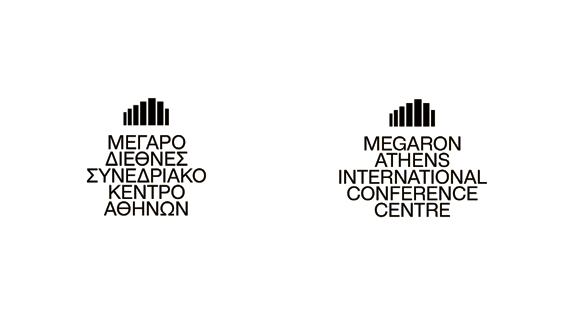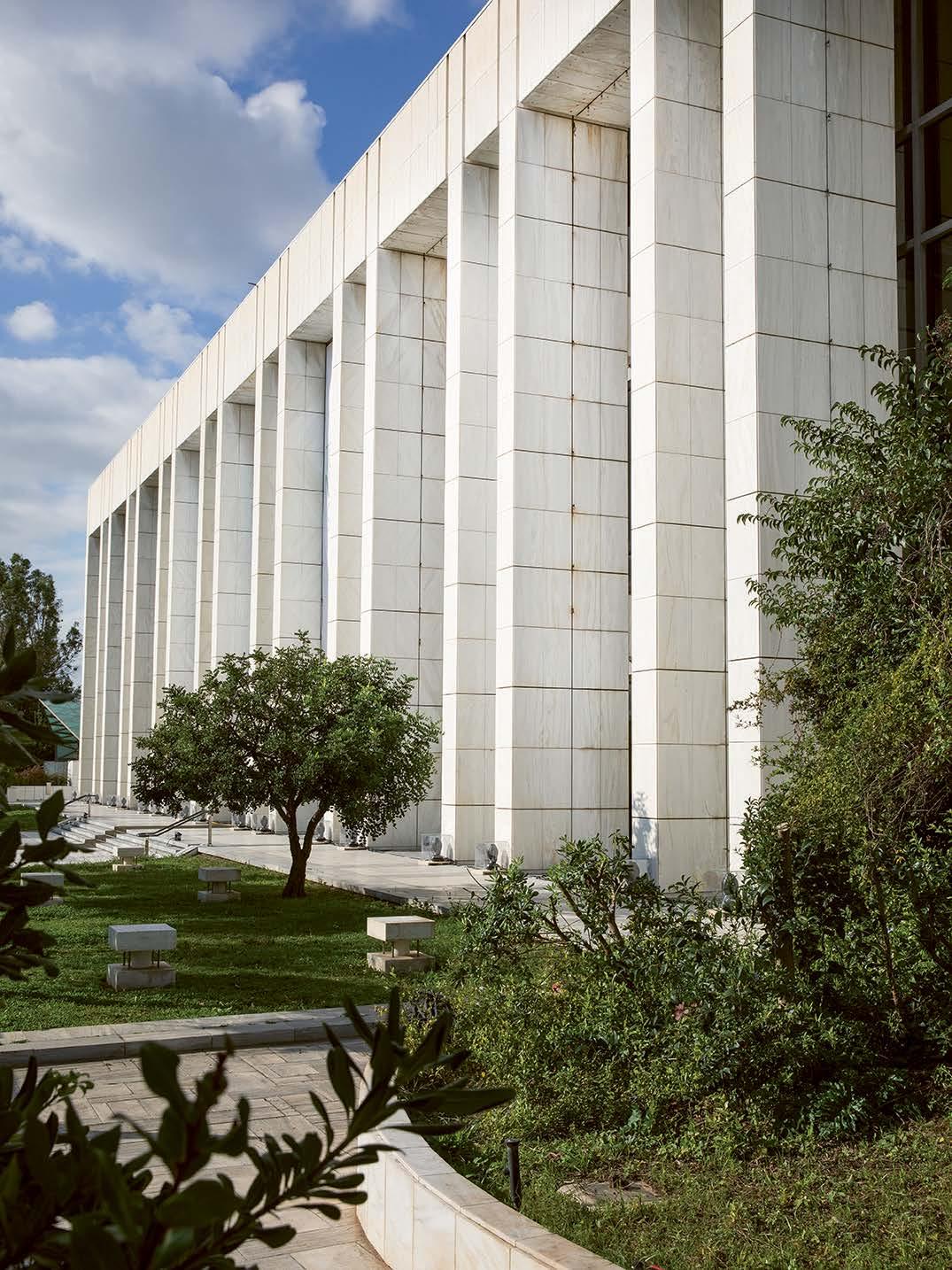ENG SAID AL SHANFARI
Oman Convention & Exhibition Centre
“The exchange of knowledge made at each event supports Oman’s overall development”

TWIN TRANSFORMATION
DIGILOGUE STRATEGY
CHAIN OF THOUGHT
CURATE AI
KELLERMAN























Oman Convention & Exhibition Centre
“The exchange of knowledge made at each event supports Oman’s overall development”

TWIN TRANSFORMATION
DIGILOGUE STRATEGY
CHAIN OF THOUGHT
CURATE AI
KELLERMAN






















Rotterdam Ahoy is strongly committed to promoting sustainability in all its activities. As one of the largest multifunctional venues in the Netherlands, Rotterdam Ahoy annually welcomes millions of visitors for a diverse range of events, ranging from international conferences and trade shows to sports events and concerts. The Rotterdam Ahoy Convention Centre (RACC) with 35 rooms, an impressive auditorium (RTM Stage), beautiful foyers, and exhibition spaces, offers the ideal setting for both large (international) conferences and more intimate business meetings. In its pursuit of sustainability the Rotterdam Ahoy Convention Centre has set itself the goal of playing a leading role in the transition to a more environmentally friendly and responsible events industry.
HVAC systems. An urban water buffer to collect, retain, filter, store, and reuse rainwater will be installed in the forecourt in the near future.
“Sustainability is not a race; it is finding solutions that continuously improve our future. We try to understand the need of our clients, the aim they have and see how we can support this.”, says Mirjam van de Kamp, Director of Conventions at Rotterdam Ahoy.
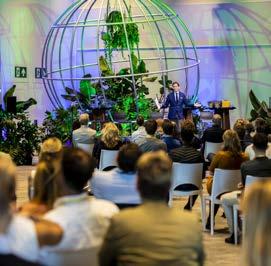
One of the key pillars of Rotterdam Ahoy’s sustainability policy is reducing its ecological footprint. This is achieved through various initiatives, such as minimising waste, efficient use of energy and water, and promoting sustainable mobility. Rotterdam Ahoy is entirely gas-free and has invested in energy-saving technologies, including LED lighting, 5,442 solar panels on its roof and advanced
In its pursuit of continuous improvement and innovation, the Rotterdam Ahoy Convention Centre remains committed to furthering the sustainability of its activities. By adopting a proactive approach and embracing new developments and technologies, the RACC is at the forefront of the transition to a more sustainable events industry. With our commitment to sustainability, the Rotterdam Ahoy Convention Centre hopes to serve as an example of how venues can contribute to a more sustainable future.
To read more about our sustainability initiatives, visit: www.ahoy.nl/en/business/sustainability



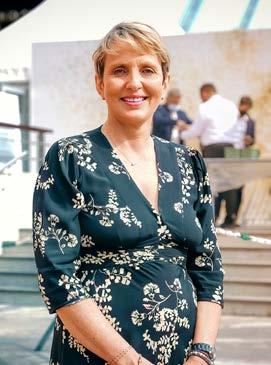

9 The App Generation Is Here INTRO Atti Soenarso about an ever more discerning application generation on a mission to expose and eliminate poor performance.
10 Driving Economic Growth ADDING VALUE Meetings International puts the spotlight on the drivers of the emerging Oman Convention and Exhibition Centre.
22 Wash Away the Complexity and Wash Out the Simple and Tangible PSYCHOLOGICAL MEETINGS Hans Gordon on streamlining and simplifying to the point of effectively quenching both reason and the love of wisdom.
28 Reinventing yourself While Keeping your DNA
STRATEGIC OBJECTIVES Balanced reinvention keeps the world’s second smallest country an important business events destination.
34 Digilogue Events: Winning the Digital Minds and Analogue Hearts DIGILOGUE STRATEGY The events industry is adopting the dual imperative of embracing technology while championing sustainability.
37 Ever Tried. Ever Failed.
INTERMISSION 1980s prose of Samuel Beckett may be inspirational only by omission, but by omission it is.
38 Global Meeting 2026: Reimagining the Delegate Experience POSSIBILITIES CREATED BY AI Rohit Talwar explores how generative AI tools could combine to enhance the experience of business events.
42 How to Build your Business Using Big Data and Analytics
THE AGE OF BIG DATA Scott Steinberg prepares us for dealing with living in times where we can see a decade of change in a matter of months.
50 Nothing but Award Washing KELLERMAN Roger Kellerman on basking in make-believe glory of a squeeky clean appearance, instead of simply cleaning up your act.
LEGALLY RESPONSIBLE EDITOR IN CHIEF Atti Soenarso atti.soenarso@meetingsinternational.com
PUBLISHER Roger Kellerman roger.kellerman@meetingsinternational.com
GLOBAL SALES DIRECTOR Graham Jones graham.jones@meetingsinternational.com
TEXT Hans Gordon, Roger Kellerman, Atti Soenarso, Scott Steinberg, Anders Sörman-Nilsson, Rohit Talwar
PHOTOS / IMAGES Zakariya Alowaisi, Sara Appelgren, Rajesh Burman, Anthony Geernaert, Afan Al Harrasi (incl. cover), Magnus Malmberg, Mark Strozier
DESIGN KellermanDesign.com
EDITORIAL RAYS OF SUNSHINE Museum of the Future + Khruangbin + Mohamed Mbougar Sarr + Brendan Pang + Robert Downey Jr + Miss Tokio
SUBSCRIPTION Subscribe at www.meetingsinternational.com or subscription@meetingsinternational.com
CONTACT Meetings International Publishing Formgatan 30, SE-216 45 Limhamn, Sweden info@meetingsinternational.com www.meetingsinternational.com
PRINTING Exakta Print AB, Malmö 2024 [environmentally certified, ISO 14001]
PAPER Arctic Paper Munken Pure 100 g + 240 g FSC labeled paper Cert No SGS-COC-1693 ISSN 1651- 9663
Facebook @MeetingsIntCom
LinkedIn @Meetings International
Instagram @meetingsinternational

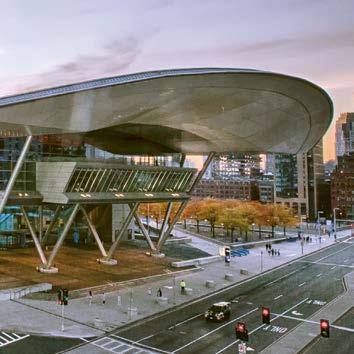
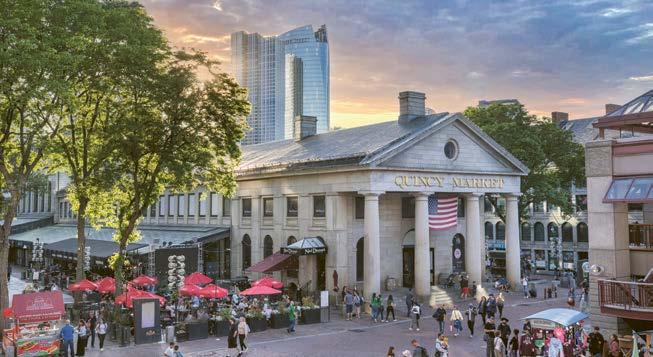

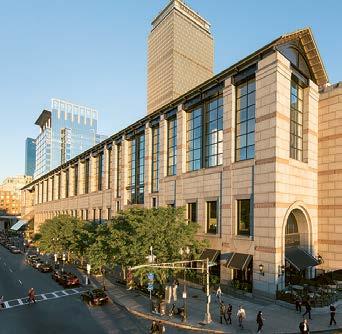
What happens outside of our two AIPC GOLD Certified convention centers, the Boston Convention & Exhibition Center (BCEC) and the Hynes Convention Center, is almost as exciting as what’s inside. Each are located in Boston’s hottest new and old neighborhoods – the Seaport District and the Back Bay – offering your guests countless new hotel rooms, trendy dining, unique shops, and endless entertainment –all steps away.
Hosting Revolutionary Events for the 21st Century
Schedule a site visit and make history with your own event. Call 877-393-3393 or visit SignatureBoston.com
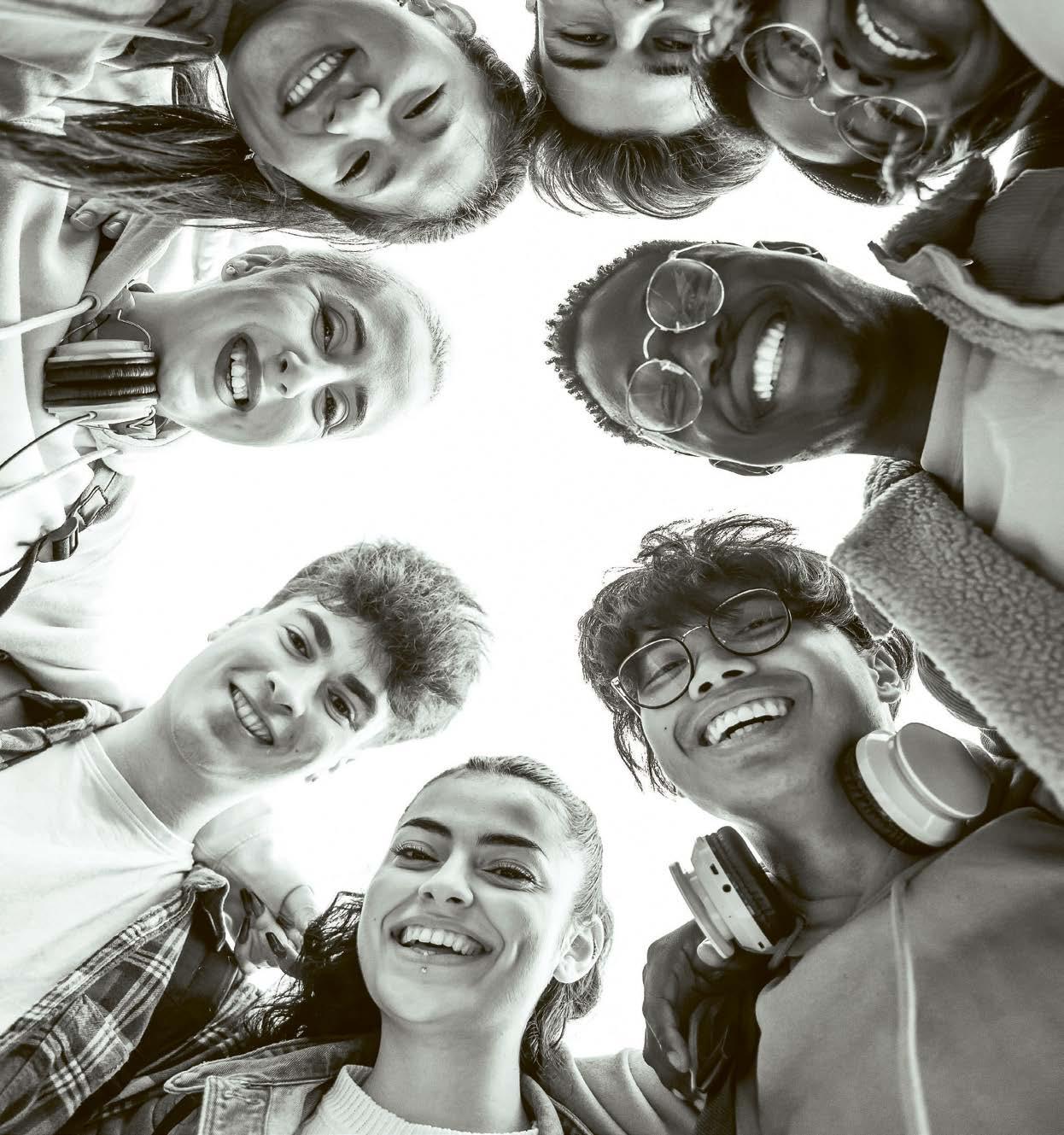
Business event delegates worldwide are becoming more discerning and sophisticated in using digital services and applications. Apps are now a part of our everyday lives and are rapidly becoming intrinsic to business events. Today, delegates are far less forgiving toward brands that fail to provide high-quality, responsive digital experiences.
Many of us have a low, or zero, tolerance for problems using digital services and applications. At the same time, the application generation has arrived, meaning a seamless digital interaction is now required. The latest research from Cisco, The App Attention Index 2023 : Beware the Application Generation, shows that 62 per cent of consumers’ expectations for digital experiences are far higher now than two years ago. The application generation constantly evaluates the relevance of digital services. Consumers aged 18 –34 use 41 different applications each month, compared to 30 amongst people aged 35 and above.
According to the study based on a global poll of 15 ,000 consumers, a new type of application user has emerged who is more empowered,

sophisticated and demanding in how they consume applications and digital services. Cisco App Dynamics has dubbed this category of user the application generation
Delegates expect business event applications to be innovative, intuitive and secure. Happy apps, when working seamlessly, can offer saving time, simplifying lives, and reducing application clutter, among other things. And the study reported that 77 per cent of consumers have stopped using or deleted applications from their devices as a result of performance issues over the past 12 months.
This shift in attitudes and behaviours is most noticeable among younger delegates. The application generation’s lives depend on digital services, and they expect digital participation to add value. They will hold any application that falls short accountable. This shift in expectation is critical for all companies and organisations delivering online experiences.
one of the missions of the application generation is to expose and eliminate poorly performing apps. App Gen’s message to application
owners is clear: deliver seamless and secure digital participation or pay the price.
one essential characteristic to be aware of is that the heavy use of digital services is a reality. It is vital to be aware of application use. Super Apps, combining multiple digital services into one app, bring optimism. Also, action will likely be taken against applications that don’t perform.
Now is the time to look at your tech stack to ensure you can easily navigate disruptions, offer the best performance, and deliver the exceptional, enriching experiences today’s delegates expect. People are deleting apps that let them down, or switching to alternative digital services. For example, for the past year, 64 per cent of consumers from the application generation in the United Arab Emirates have deleted more apps than they have installed.
However, function alone is not enough. Application users demand quality and performance and seek the most innovative online experiences. Companies and organisations must work hard to impress the younger delegates or risk losing them.
Swedish-Indonesian Atti Soenarso has worked as a journalist for over 40 years. She has worked for Scandinavia’s largest daily newspaper, was TV4’s first travel editor, has written for many Swedish travel magazines and has had several international clients. She has travelled the length and breadth of the world and written about destinations, people and meetings.
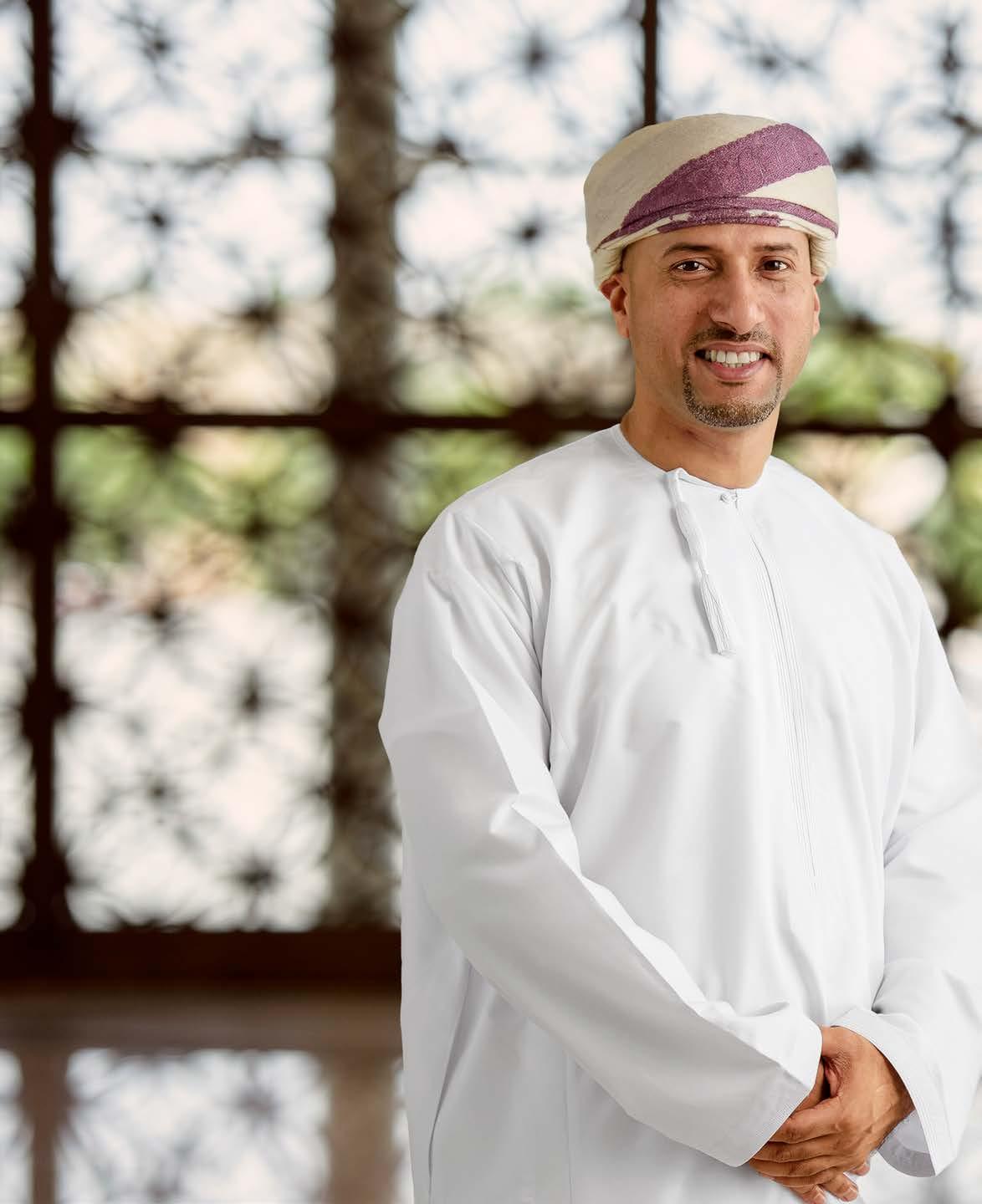

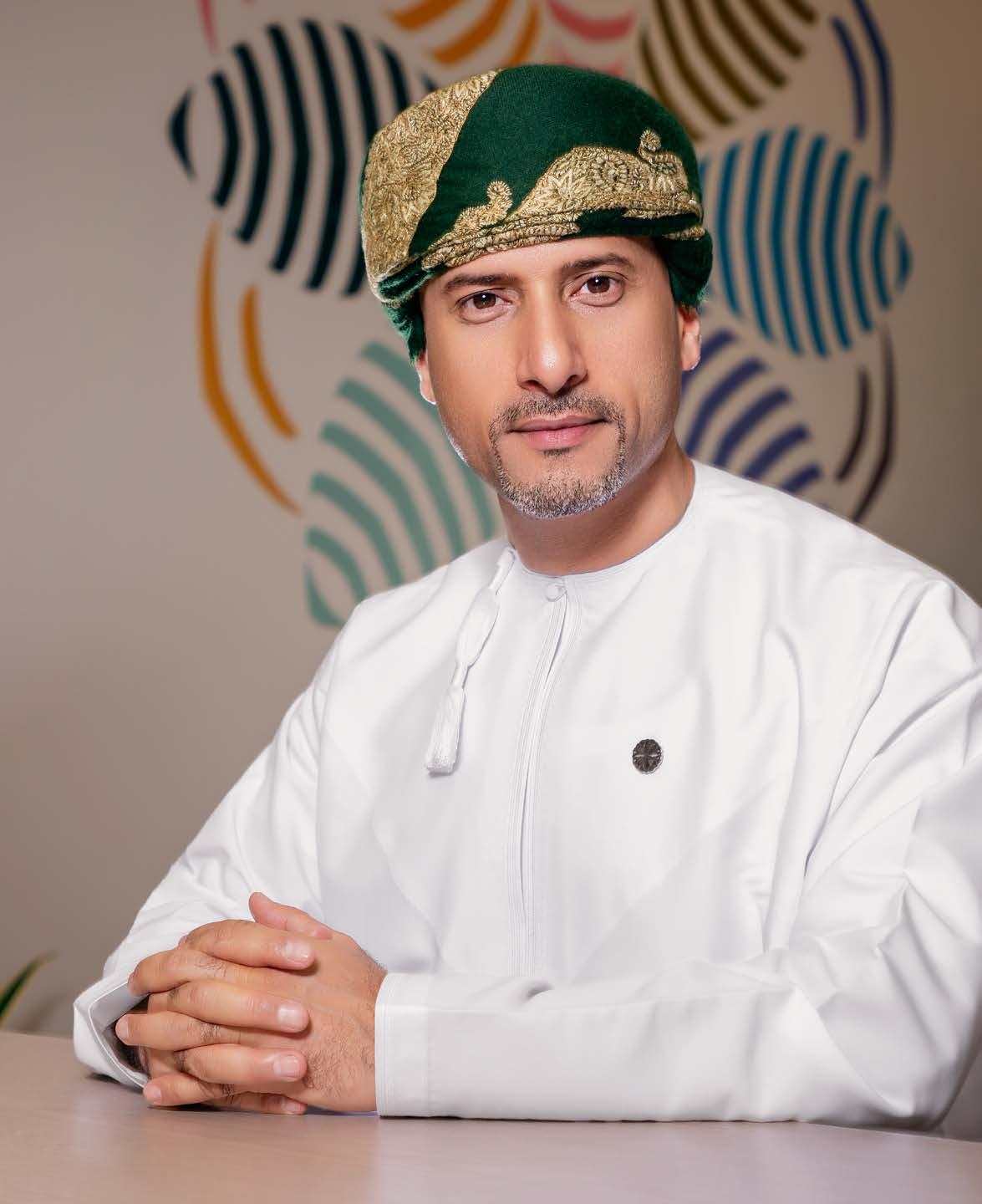
As the CEO of o man’s premier event centre, Eng Said Al Shanfari’s ambition to make the o man Convention and Exhibition Centre, OCEC , a leading regional venue has never wavered. When the job became his in 2018 , Eng Said Al Shanfari never expected to stir through global economic crises and a pandemic as he continued to make the venue attractive on the regional scene. His and his team’s efforts paid off last year as the OCEC experienced a strong rebound post-Covid with a 25 per cent increase in visitors at the centre.
The award-winning venue is positioning itself as a leading destination for regional events. It benefits from state-of-the-art facilities, first-class hospitality options, and a 15 -minute location from Muscat International Airport. The centre is owned and developed by omran Group, a part of the Madinat Al Irfan urban centre.
For 2024 , the focus is on capitalising on last year’s success. The venue is starting the year high with business events of significant importance for
the region, including the Middle East Space Conference, the International Oman Pharmaceutical Conference and Exhibition, and the General Arab Insurance Federation conference, which will bring together industry leaders across the Middle East and North Africa, MENA, region.
“our strategic drivers for 2024 are based on the economic context, key industry trends, and the centre’s ambitions. This year, the team is working towards three main goals:
“ We want to become a more sustainable venue in the region, ultimately becoming a global destination for sustainable events”
sustainability, digitalisation, and inclusivity. Many industry experts have emphasised all three trends, specifically the importance of reducing the sector’s environmental impact while providing events tailored to audiences,” says Eng Said Al Shanfari.
“We want to become a more sustainable venue in the region, in terms of our facilities, limiting our carbon impact, leading in terms of environmentally friendly technologies, and ultimately becoming a global destination for sustainable events. It aligns with the omani government’s strategy to diversify its economy, focus on green energies, including solar power and reach net zero by 2050.”
If sustainability is a key driver for 2024 , digitalisation and inclusivity also go together. Eng Said Al Shanfari wants event organisers choosing the OCEC to access the best technologies worldwide and benefit from new digital marketing options to promote their events in oman and beyond.
“There are two sides to digitalisation: internal and external. on the one hand, working hand in hand with our marketing, sales and events teams, we are focused on improving
our use of technologies to become more efficient when bidding for international events, managing visitors and delegates and communicating about our programme. Externally, we’re looking at creating a new podcast studio for Q3 2024 and other digital marketing options providing a more seamless experience for our delegates and event organisers alike.”
Eng Said Al Shanfari says the ultimate goal will be to continue catering to a wide range of audiences, ensuring that the events attract local, regional, and international visitors of all ages, interests, and professions.
“People will come to the OCEC throughout their lives, whether for professional purposes or personal hobbies. our strength is making our programme diverse and inclusive while creating a more tailored experience for each visitor so everyone feels welcome.”
Asked if the centre is focusing on the trend of building more personalised events, Eng Said Al Shanfari answers:
“We always ensure that organisers can cater their events to the local community by supporting them

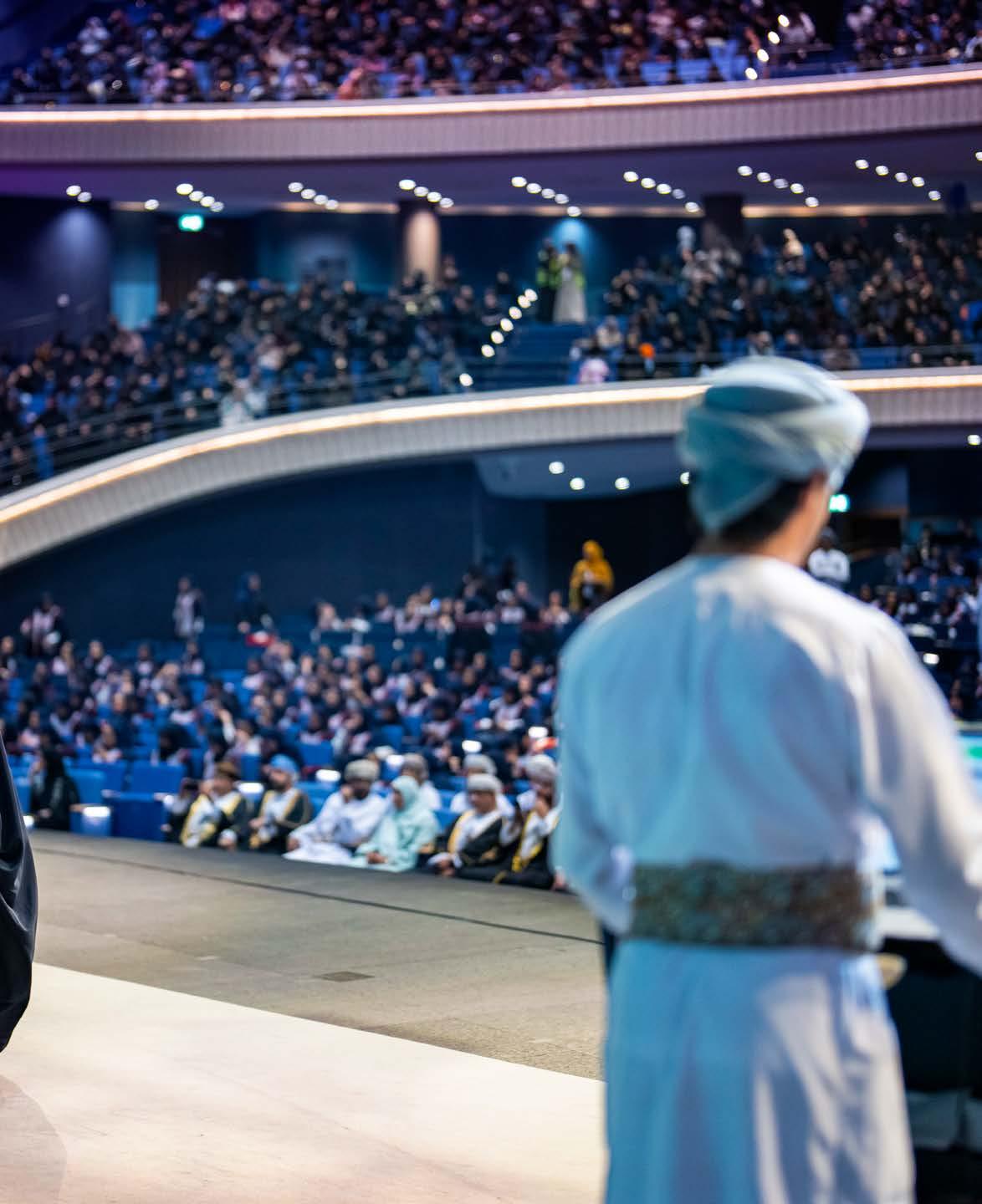
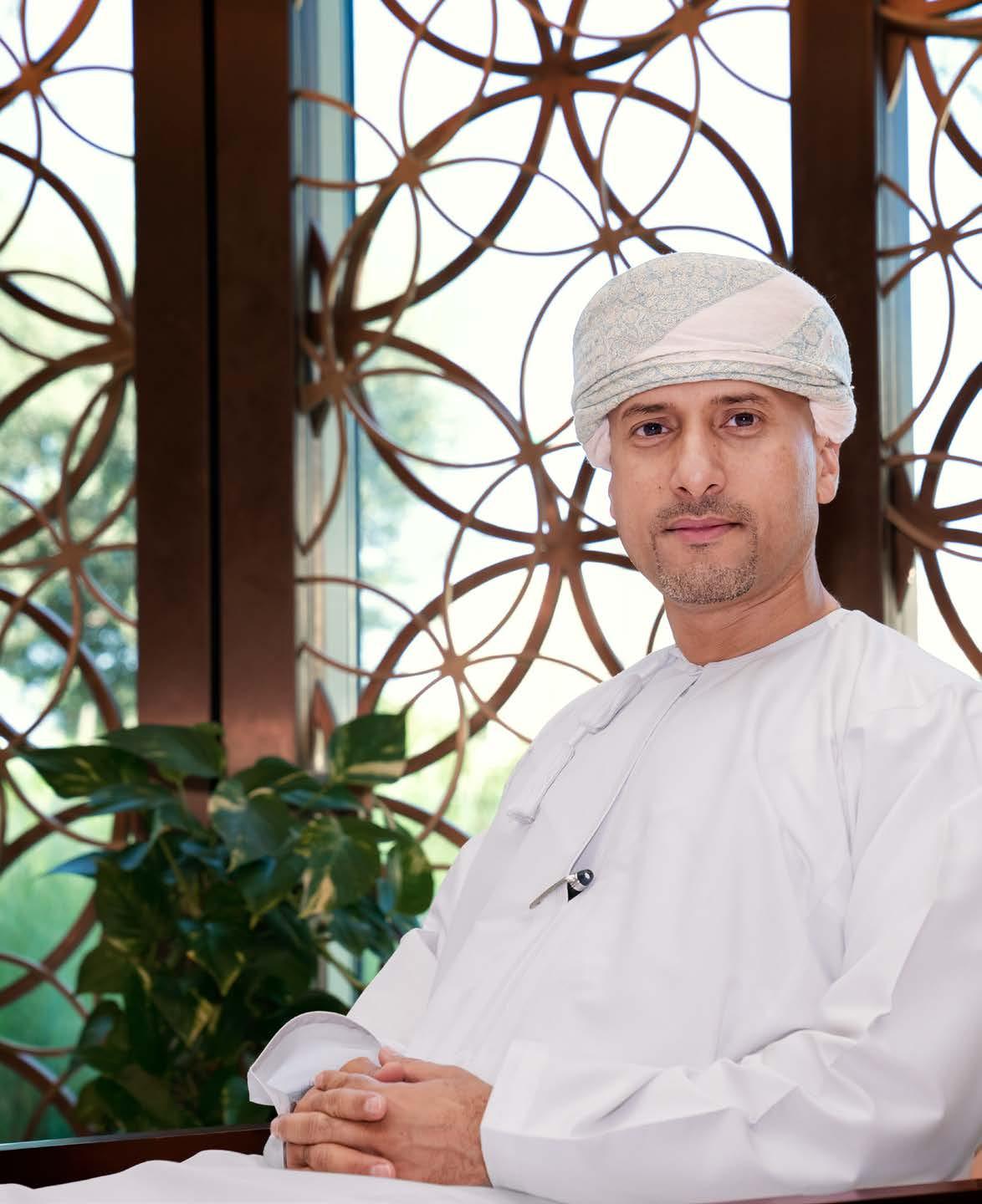

“We are directly driving economic growth by attracting events that generate income and jobs for our country”
through cultural briefing and advising. We have seen a trend towards smaller, more targeted events. However, in the region, large-scale conventions and conferences still dominate.”
With these strategic drivers in mind, the OCEC is set for a pivotal year, positioning itself as a green venue in the region. The centre averages 230 annual events across conventions, exhibitions, conferences, business events and live shows. Although the venue caters for all sectors, it has a track record of hosting oman’s leading events around sustainability and energy, such as Oman Sustainability Week, Oman Petroleum and Energy Show, Green Hydrogen Summit, and Oman Water Week, among others.
This year, it stands out in this field with the recent announcement of a major solar panel project in collaboration with Total Energies Renewables and omran Group, its parent company. The project itself is ambitious. Thanks to over 8 ,000 solar panels on its 16 ,000 m² rooftop surface, it will power the whole convention and exhibition centre
with solar energy, the largest rooftop solar project in oman. Equivalent to 63 double tennis courts, the surface will provide energy for the OCEC and beyond, avoiding 3 ,500 tonnes of CO2 annually.
“This project has been planned for a long time and follows several initiatives that we have implemented in recent years, including our Gold LEED Building certification, EV charging stations, solar panels used for our cooling systems, and other initiatives to reduce food waste and plastic use in our venue.”
Equivalent to 90,000 trees being planted at the convention and exhibition centre, the project is a turning point for the venue and the country as a testament to the centre’s commitment towards sustainability.
“We are already known in the region for some of our leading environmentally focused events. We hope this will show global event organisers that we are ready to innovate and make our venue greener while still providing excellence in our events services.”
Currently, under construction, the project should become viable in
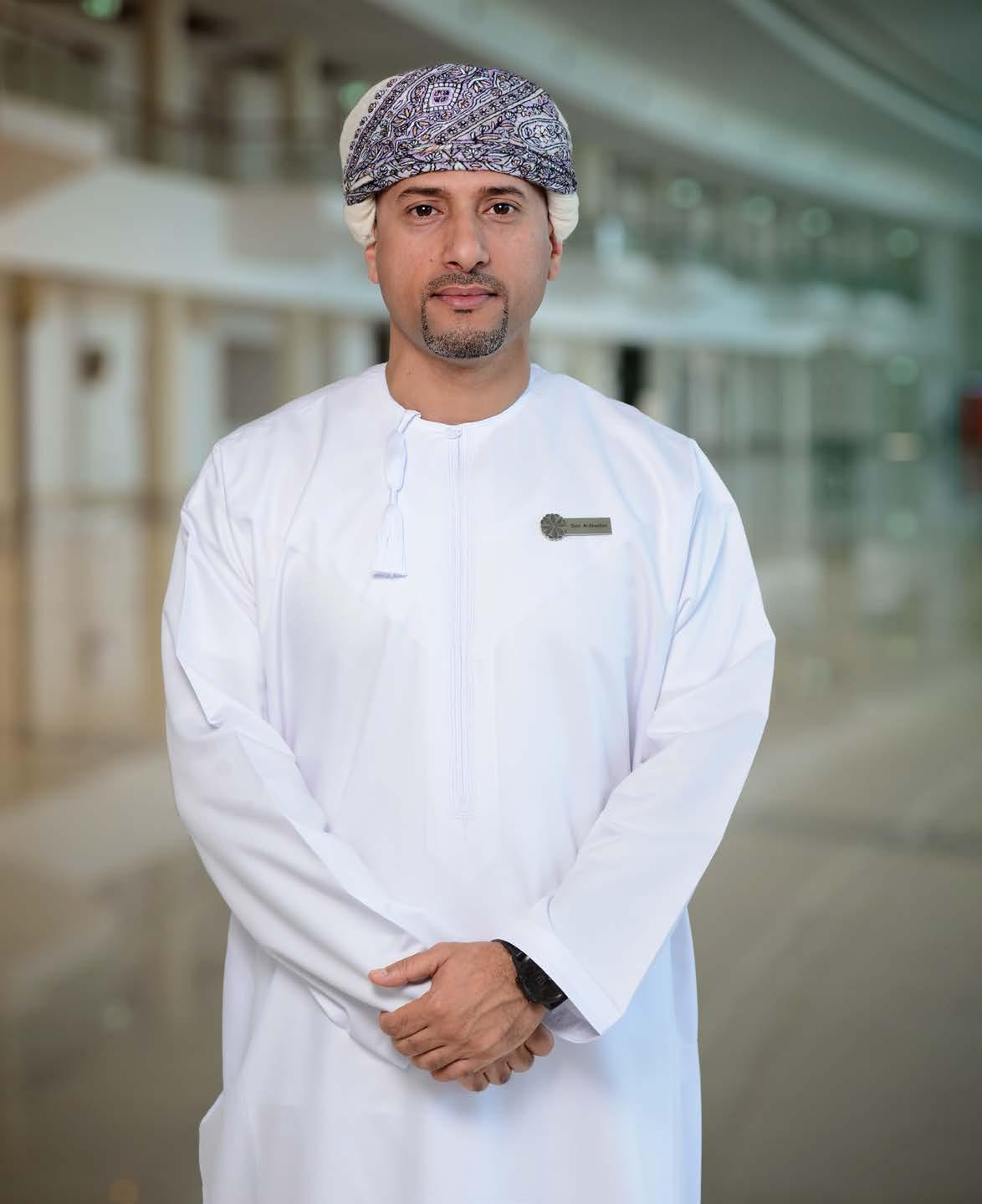
“It aligns with the Omani government’s strategy to diversify its economy, focus on green energies, including solar power and reach net zero by 2050 ”
Q2 2024 , giving space for more events to benefit from this added value to the OCEC, including the Oman Sustainability Week in April.
Since its implementation in 2016 , the venue has been at the centre of the Sultanate of oman’s economic diversification and focus on driving the tourism industry. Concentrating on business events, the oman Convention and Exhibition Centre has gradually increased the country’s economic growth and attracted international investments by winning major regional and international bids over the years.
“We are directly driving economic growth in two distinctive ways by attracting events that generate income and jobs for our country and the hospitality industry. our research shows that total direct income from the business events industry is estimated at 1 9 billion US dollars. When we win an international event bid, we can secure international companies and delegates who often travel using premium services.”
Beyond the direct economic growth generated by the venue, it is its strategic offering which has a broader impact on the country:
“Indirectly, the OCEC is a physical space enabling conversations on sustainability, green energy, education, urban development, or health in oman. The exchange of knowledge, the meetings between local and international entities, and the advancements made at each event support our country’s overall development. It may have no defined economic value but is symbolically invaluable for oman.”
The centre won the prestigious Best Venue award at the Middle East Events Awards in 2023 , competing against other leading venues in the region. The win assured oman’s strong visibility and positioning on the regional stage.
“This extremely competitive industry relies on many factors beyond technology and event services: your brand positioning, overall infrastructure, and expertise. Winning this award was a great accomplishment for the team, matched by a new record-breaking number of visitors in 2023 . Keeping the momentum going will be our main goal this year, through some strategic drivers discussed above and our team’s dedication.”
As the UFI Middle East and Africa Chairman, Eng Said Al Shanfari’s vision expands beyond the Sultanate of oman. Although competition is prevalent in the region, he believes in combining each venue’s attributes to grab a global share of regional business events.
“We saw it recently with COP28 happening in the United Arab Emirates. The world was focused on this global event and the region. The OCEC hosted the Oman Green Hydrogen Summit in parallel to COP28 . Many delegates, including the European Commissioner for Energy, Kadri Simson, came to oman following their visit to COP28 to engage with key local partners. If we work smart, we can capitalise on the industry’s success and attract more regional and international visitors to our events.
“In parallel, oman is turning its eyes to tourism, and business events are a source of revenue from which small- and medium-sized enterprises in the country benefit.”
Innovation defines Eng Said Al Shanfari’s vision for the future of the oman Convention and Exhibition Centre. He sees the venue and oman as a growing destination: leisure
“Thanks to over 8 ,000 solar panels on its rooftop surface, it will power the whole convention and exhibition centre with solar energy, the largest rooftop solar project in o man”
tourism has consistently grown over the past few years as more visitors are attracted to the country.
“Business events are increasing as organisers seek more than venues: they are looking to offer their delegates an extraordinary cultural and professional experience in a relaxed setting.”
The centre does not work in silos with other organisations. Every year, it empowers over 90 small- and medium-sized enterprises and supports overall sector growth through graduate job opportunities for local populations, training workshops and outreach programmes. The aim is to inspire more companies and employees to join the sector and see its economic value and benefits in the long term.
“I like to be involved in many sectors of growth in my country, and I cannot help but think that our professional goal should always be focused on legacy. What are we leaving for the next generations? How can we empower them? How can we learn from them? These questions drive us to be more innovative and flexible in our approach, keeping up with trends and ensuring that the OCEC continues
to belong to oman and its future generations.”
Where the World Meets, the venue’s motto, has never been so relevant when the region is growing to become one of the leading global business events destinations.
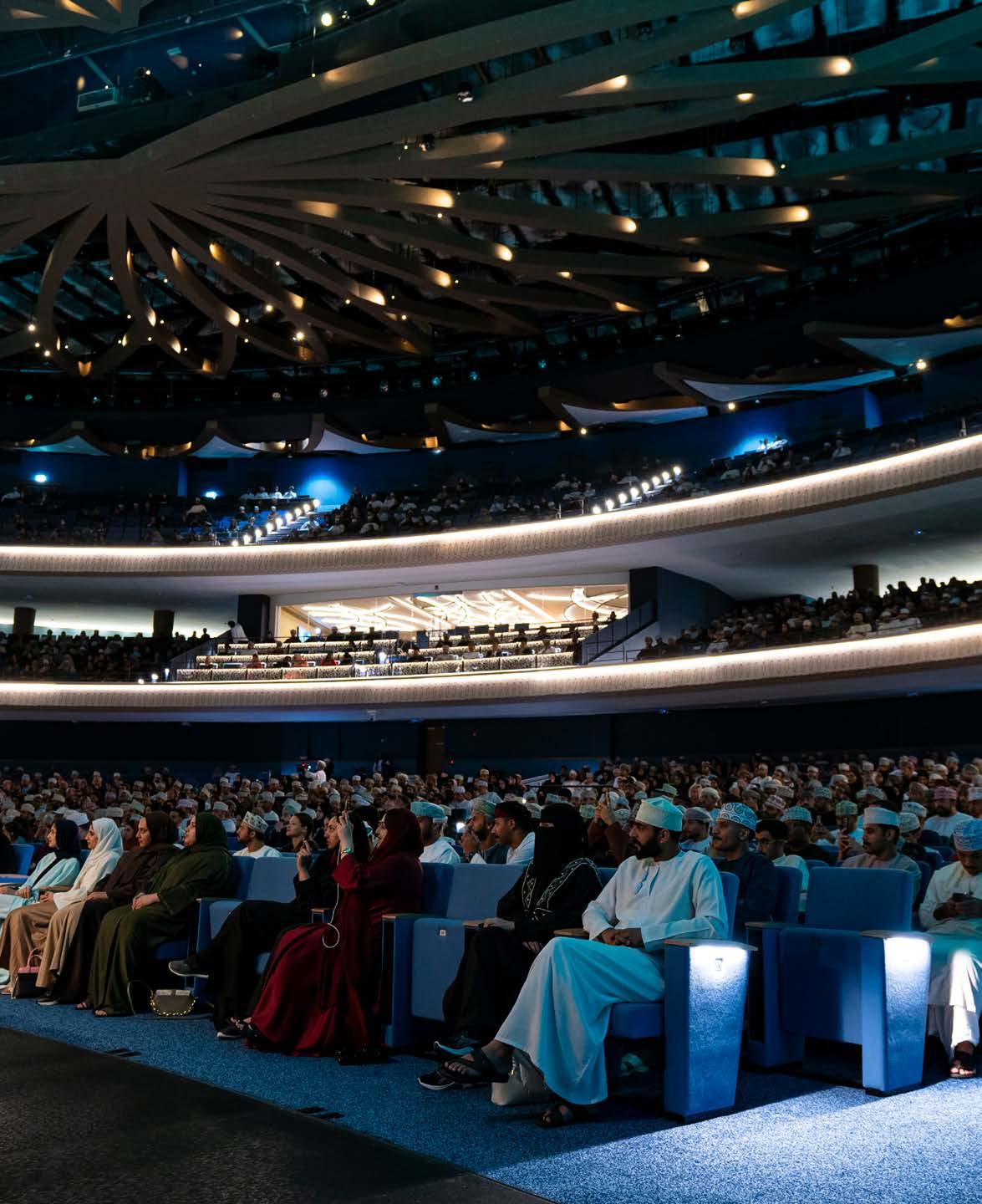
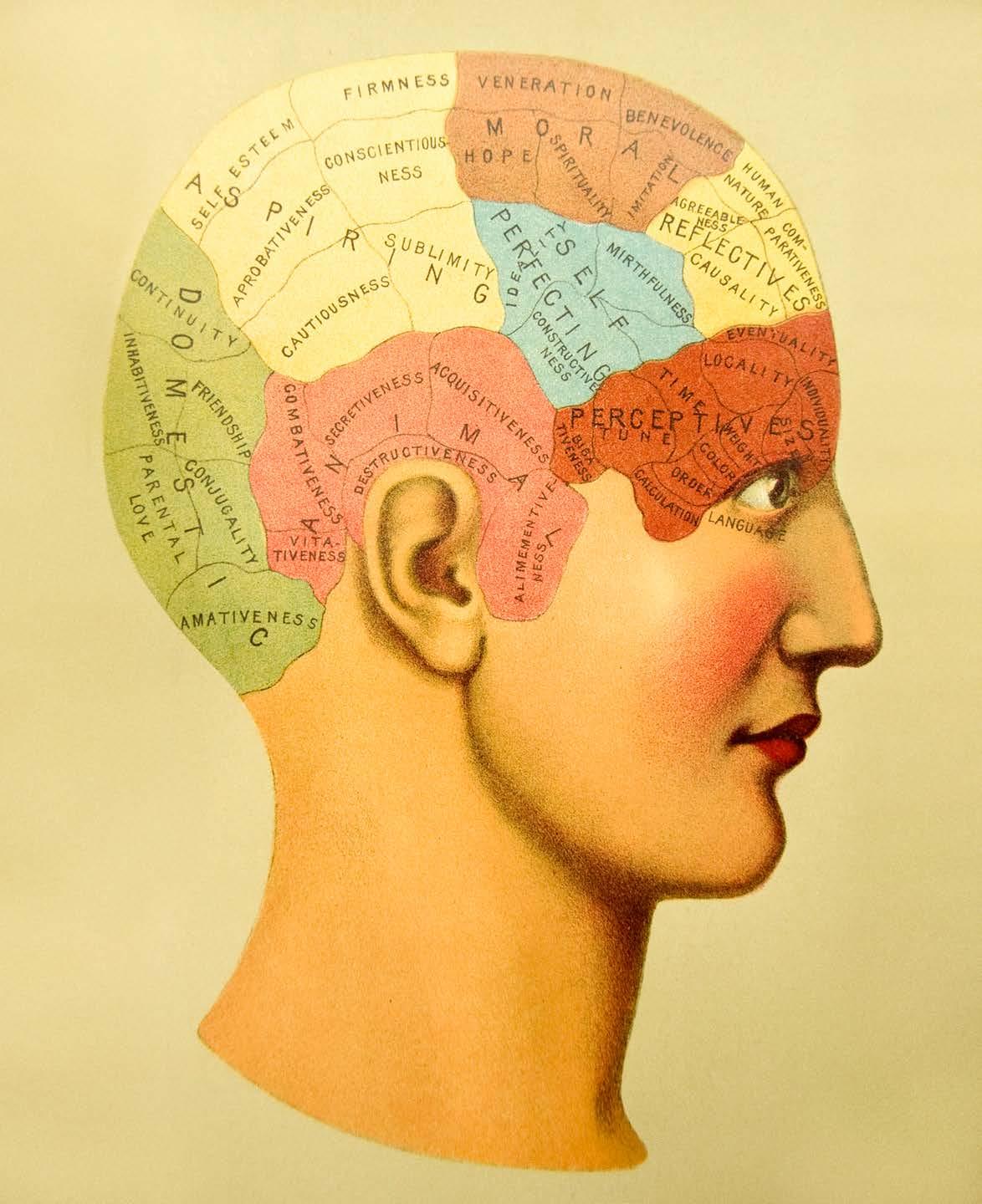
 PHOTO Sara Appelgren
PHOTO Sara Appelgren
Hans Gordon, PhD, Associate Professor, Authorised Psychologist, specialised in Aviation Psychology. Authorised psychotherapist, since 1987 running Gordon Consulting. Has for decades been engaged by airline companies, among them SAS and Thai Airways International.
o n the journey of psychologists from the chambers of philosophy to the autopsy tables.
‘Hello. Nice to meet you. Please allow me to tell you who you are.’ Such is the introduction, polite but firm, extended by personality tests. When we first encounter them, we are strangers (even, as some tests would have it, to ourselves). When we part sometime later, we’re a known quantity, nearly tagged. Personality tests take wildly different forms, questionnaires, inkblots, stories, drawings, dolls, but all make the same promise: to reduce our complicated, contradictory, changeable selves to a tidy label. The tests claim to measure not what we know, but what we’re like; not what we can do, but who we are.”
Excerpt from The Cult of Personality Testing by Annie Murphy Paul, former editor-in-chief of Psychology Today magazine
Psychology, the study of the human psychological world, or rather worlds, constitutes an enormous academic research and education field. Its foundations were laid in early Greek philosophy and carried on through
the European Middle Ages to modern times with contributions from older Arabic philosophy. The word philosophy comes from Greek and can best be translated as the love of wisdom, where a commitment to
understanding nature, existence, our experiences, and thought life is achieved through critical examination, careful reflection and in-depth dialogue. Reasoning is a crucial concept in this context.
Philosophy remains an essential scientific foundation, particularly in the social sciences. Psychology, with its scientific study of the human being, has always been a powerful and far-reaching branch of this tree of knowledge, whereby the human being
to the otherwise necessary domain of natural science, dominated by disciplines such as physics, chemistry and mathematics. However, this has occasionally, not least in modern times, posed problems both for the mainstream academic community (colleges and universities) and for applied psychology in general, especially that practised in health care.
To focus on health care: it has mainly been organised and governed by the administration that has its
“ They had managed to wash away the ever-discussing philosophical psychology with all its diverse investigations and conclusions”
is studied with a particular interest in the historical, social and cultural context in which we all live and work. Such studies pay particular attention to the general psychological development that starts in infancy and continues throughout life. It focuses, among other things, on the identity problems of adolescence, especially the emergence and stabilisation (or not) of gender identity, specific psychological complications in adulthood, ageing processes, etcetera. Everywhere, the individual interacts with the environment, both the immediate family group and society. For that reason, the discipline of psychology has usually emphasised social psychology as a central sphere where more conventional natural laws do not apply and, thus, do not automatically reveal themselves. one should not simply assign psychology
roots in the branch of school medicine that has been part of the natural sciences for centuries. In the theory of science, which studies science as a form of understanding, the natural sciences are classified as belonging to a specific branch of research methodology called positivism. Positivism refers to the view that knowledge is limited to the given or the positive. The given and the positive are linked to experience. In positivism, science’s main task is to describe regularities in the given, mainly when these regularities can be expressed in cause-and-effect situations. The external world is usually assumed to be a closed existence in itself, a world that humans as spectators try to participate in and explore, but where the activities of exploration themselves do not significantly affect or change the external world or reality.
Incorporating psychology as a field within positivism means that psychology must be cleansed of more purely contemplative and reflective enquiry, with everything more open to deeper discussion. The doctor wants distinct answers to his questions and more apparent facts. These facts should come from repeated and well-controlled experiments. If you give the patient drug X, after some time, Y will occur, and if Y is considered desirable, the matter is settled. Suppose the psychologist can assist the doctor by introducing training method B to enhance the Y effect further. The psychologist is welcome to continue with that treatment intervention in that case. With positivist research orientation as a basis, doctors and psychologists have achieved what is usually called evidence, a form of proof used to establish evidence-based knowledge So, they have satisfied themselves. Therefore, psychologists have taken considerable steps away from the motto of love to wisdom via contemplation, reflection and dialogue, thus creating a more open and flexible search for knowledge. How has this happened? What has been washed away in psychology?
Let’s return to the beginning of the last century, the immediate post-1900 period. In many ways, this was a time of transition between the historically rooted romanticism and the more materialistic view of the emerging rationality, which claimed that one plus one could not be other than two and that all problems could, therefore, be solved with the help of mathematics. But the residual Romantic dream was still there, preaching the possibilities and continuing to stimulate artists’ acts of creation and breakthrough attempts to make people see the world and life not just as a realistic still life but as something
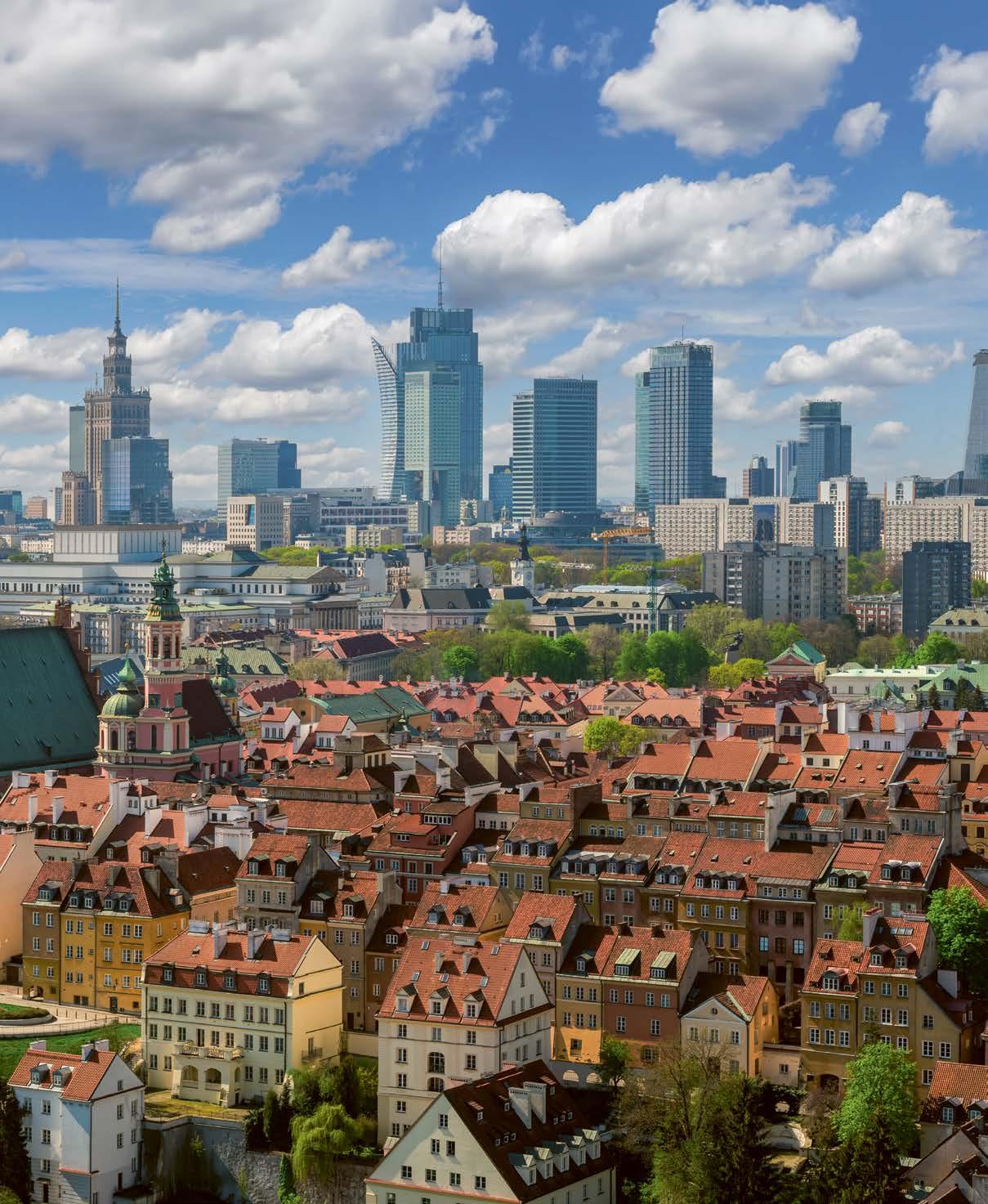

More than you expected Stand G445
“Let’s wash all this away in favour of modern, irrefutable facts”
that could be grotesquely exaggerated and yet soulfully beautiful, a time when kindness and violence went hand in hand, a time for a Pablo Picasso (1881–1973), poet and artist, and a Charles Spencer Chaplin (1889 –1977), film genius and composer Charlie Chaplin and a host of other like-minded people.
It was also a time for Sigismund Freud (1856 –1939), who later changed his first name to Sigmund, and who in 1873 graduated from high school with the highest grades and as the best student, already demonstrating an extensive knowledge of several languages, including Latin and Greek. As you may know, Freud became a doctor, specialising in neurophysiology and neuropathology. In the late 1880 s, he studied further for a year in Paris, where he became particularly interested in the then-popular concept of hysteria, which seemed to explain many cases of paralysis and the like by analysing more profound psychological complications, especially in younger women.
Freud became particularly interested in what he encountered here, learning hypnosis, starting research and publishing in 1895 a Draft of a Scientific Psychology, which was to be followed by articles, books and a
series of lectures steeped in theories of human psychology. Hence, the much-publicised and much-debated psychoanalysis. A complication in this context was that psychoanalytically based psychology was complex and gave rise to as many new questions as it found answers to. There was, therefore, in parallel, a desire for clarity, more simple clarification, something that, instead of grey scales, could present things in a more limited blackand-white light. Shouldn’t the whole of psychoanalysis, and preferably Freud himself, be washed away?
Yes, many think so. Articles are written and published that portray Freud as almost idiotically conservative, misogynistic, a drug addict and also a liar. Psychoanalysis is dead, say several less insightful behavioural scientists and psychologists. Let’s wash all this away in favour of modern, irrefutable facts. Away, away, wash, wash! The fuzzy stuff has to be cleaned up, and the primary way to do this is to use a new “wrapping paper”: numbers and scales are more accessible to sell than in-depth analyses and reflective insights.
Already in the 1930 s and 1940 s, some researchers in psychology, inspired by the successes of the natural sciences, had begun to publish
several reports outlining ideas on obtaining data that were both clarifying and consistently reliable about the human psyche. A particularly notable researcher in the US was the psychologist Edward Lee Thorndike (1874 –1949), who made the following point in one of his writings: If something exists, it exists in a certain amount. And if it exists in a certain amount, it can be measured. Therefore, what is not measurable does not exist. Through questionnaires and tests that measured distinct characteristics, psychometrics emerged, the technique of using mathematical statistics to build scales and produce what are often thought to be irrefutable, evidence-based facts. The fact that several other scientific methodological paths alongside positivism, such as hermeneutics, phenomenology, and the steadfast and stubbornly persistent psychoanalysis, were of little concern.
This is an expression of what is called physicalism. It is in direct line with what has been described above as positivism. Thorndike came to represent the object-orientation of psychology: man is the bearer of qualities that resemble objective things. Human psychological life is filled with measurable “things,” such
“Psychologists have taken considerable steps away from the motto of love to wisdom”
as genes, chromosomes, cells, and organs. All these objects can be found using various instruments and methods of investigation, and once found, they can be measured in terms of their appearance, activities, and how they affect and are affected by other bodily objects. Voilà!
Physically orientated psychology soon came to dominate the medical profession and other contexts where applied psychology was required. They had managed to wash away the ever-discussing philosophical psychology with all its diverse investigations and conclusions.
During the latter part of the 20 th century and the beginning of the 21 st century, many more or less ambitious studies emerged that came to link psychology and the natural sciences even more closely. Everything that exists can be measured, and what is measurable can be placed on scales, so it is possible to make comparisons and ratings or equivalent categorisations, and that is where we are mainly today. Human intelligence has long since been divided into intelligence ratios following a standard distribution curve (Ha! I got 132 in IQ, while you are only at 108), and the same has happened in personality psychology.
Personality is also measurable, following The Big Five (not to be compared with The Big Five in the African wilderness). The Big Five in humans consists of five, say five, central personality factors, carefully developed via factor analytical, mathematically based methods. The positivisteducated and trained psychologist thus regards the human being as a container, a living, larger object with contents that can be mapped in much the same way as an autopsy technician can do with a deceased person on a bench: several static personality traits are embedded among all the other organs; they are what they are, shaped by both genetic and environmental factors or “things”, after that the psychologist now finishes washing and tells us who the person under study is at heart.
Instead, they imagine who they are, who they have been in the past, and how they will manifest themselves. As a result, these ideas are mainly based on techniques described as evidence-based but far from the original motto of love of wisdom

The Principality Monaco is a globally renowned business events destination for the quality of its infrastructure, the level of safety it offers, and their work on sustainability. The country’s event calendar shows hundreds of professional meetings in various fields, strengthening the principality’s position as a meetings destination.
There are business event sectors that are keener to come to Monaco than others: finance and insurance, medical, technology, and environment. Many offers and services are available within only two square kilometres. The principality, located on the French Mediterranean east coast, is the second-smallest country in the world. It lies just 30 minutes from Nice Côte d’Azur Airport, France’s second busiest airport, which links the principality to over 121 destinations in 45 countries.
Monaco is a cosmopolitan destination, mainly urban, and has
been ruled by the Grimaldi family since the Middle Ages. over 50,000 people work daily in more than 5 ,000 businesses, including many major international companies, while the resident population is under 40,000, including 132 nationalities.
Since 2019, Christine Barrabino has been Head of The Monaco Convention Bureau, a Monaco Government Tourist and Convention Authority (DTC) department. She says the convention bureau’s most important goal is to be one of the best valuefor-money destinations for business events. In addition to this, Monaco is a destination where opposites attract: Tradition meets modernity, business meets leisure, luxury meets casual, and the Mediterranean Sea meets the mountains.
“our motto is to reinvent ourselves while keeping our DNA. We constantly reinvent ourselves while keeping who and what we are alive. Choosing Monaco means gathering
participants and exchanging ideas and business prospects in a responsible setting.
“Monaco, as well as the private sector, invests heavily in infrastructure to offer the best possible work environment: practical, high-quality, and comfortable. It is true for our hotels, restaurants, Sporting MonteCarlo and one Monte-Carlo venues, and Grimaldi Forum, our main congress centre.”
and Convention Authority (DTC) has focused on them for some years. In 2022 , DTC announced the creation of a CSR division.
“More and more organisers are concerned and express the will to be as responsible and sustainable as possible. This concern affects organisers and participants. our CSR department works on all business events and leisure parts to help implement the most responsible behaviour and tools.
“ Monaco is a luxury and sustainable destination – it is in our DNA”
The principality has been dedicated to maintaining a very high level of safety. Christine Barrabino claims that security is one of the assets; the size of the country is another. For example, you can plan your activities within walking distance and bring different companies to collaborate to bring success to an event.
“on that specific matter, the convention bureau acts as a one-stopshop for the destination, smoothing relations with all business events partners. Accommodation can be challenging for giant events, but with all hotels included, there are around 2 ,500 rooms, with various solutions available when needed.”
The environment and sustainable development are core priorities for the Monegasque State, both nationally and internationally. Environment, social issues, responsibility, and sustainability are fundamental concerns, and the Monaco Tourist
For example, the convention bureau recently launched The Sustainable Event Planner’s Guide, dedicated to the business events segment,” says Christine Barrabino.
“The business events industry is, by nature, a producer of temporary projects, often in different places worldwide, as most participants come from various locations. It implies significant logistics, equipment, travel, and accommodation of participants, all for a limited amount of time. For these reasons, the business event sector is rarely associated with a sustainable activity when discussing Monaco’s most important strategic question today.
“Therefore, we must answer the question of how we can successfully combine sustainability and the business events industry. To rally our local partners and event organisers, we must lead by example. our commitment as a country is the best
guarantee that we are involved in the best possible practices combining environmental and economic sustainability. In this perspective, Monaco maintains competitiveness and responsibility.”
The Principality of Monaco is known as a destination associated with luxury. Can luxury be sustainable in any way? Christine Barrabino answers that sustainability has been at the heart of Monegasque concerns for a long time. In Monaco, environmental protection has been treated as an issue of central importance for many years. She says a luxury product expects to last in time, so the concept of sustainability is near. She explains with an example where a CSR director at a hotel in Switzerland expressed: ‘You buy a beautiful watch, and you know the quality is very high. It means you can give the watch to your child as you see it expects to last in time.’
“Monaco is a luxury and sustainable destination. It is in our DNA. The destination and our partners adopt solutions to ensure resources are managed efficiently. For example, over 80 per cent of hotels have opted for environmental certification. At the same time, soft mobility is being promoted by developing a public transport network and efficient intermodal solutions. Also, I should mention thermal energy, which consists of using heat pumps to heat or cool buildings.”
This technology, implemented in Monaco in the 1960 s, has been proven entirely sustainable and is used, for example, in the congress centre Grimaldi Forum. Awareness-raising initiatives are regularly organised on themes ranging from selective sorting to the fight against food waste and the importance of protecting biodiversity. Reconsiderable efforts are
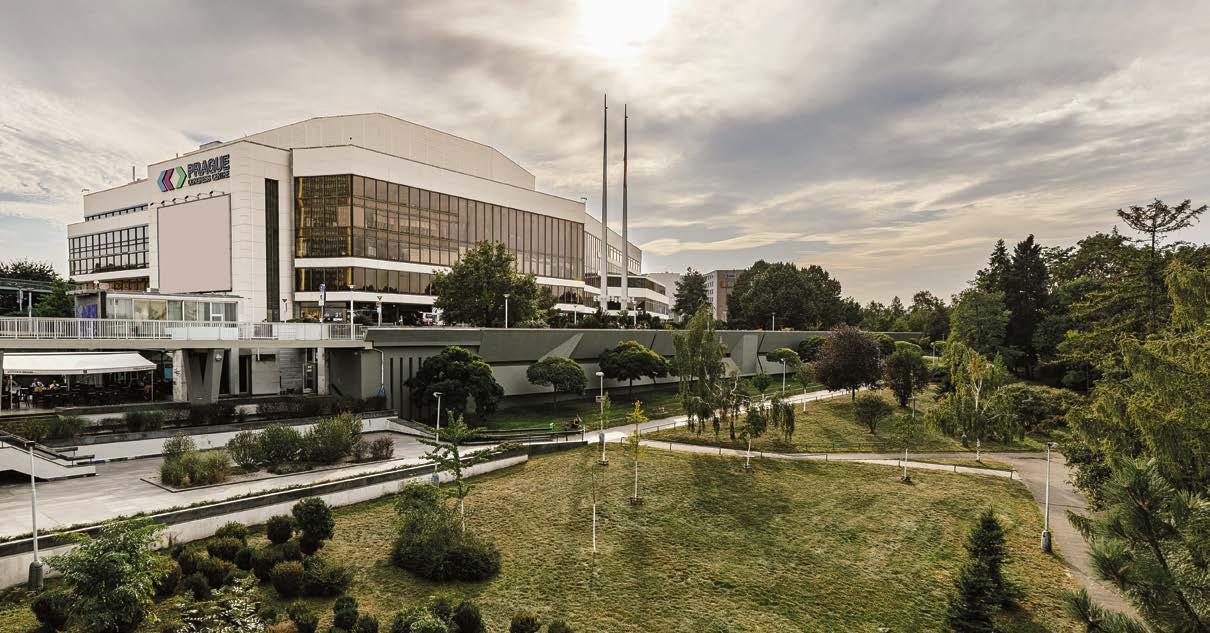
How about hosting an international congress in a living-art gallery with a direct view of Prague at your fingertips? Or perhaps a business meeting in an iconic interior design setting? Imagine a conference that is not only professionally enriching but also purely sustainable. The Prague Congress Centre offers it all.
+420 261 172 222 booking@praguecc.cz praguecc.cz
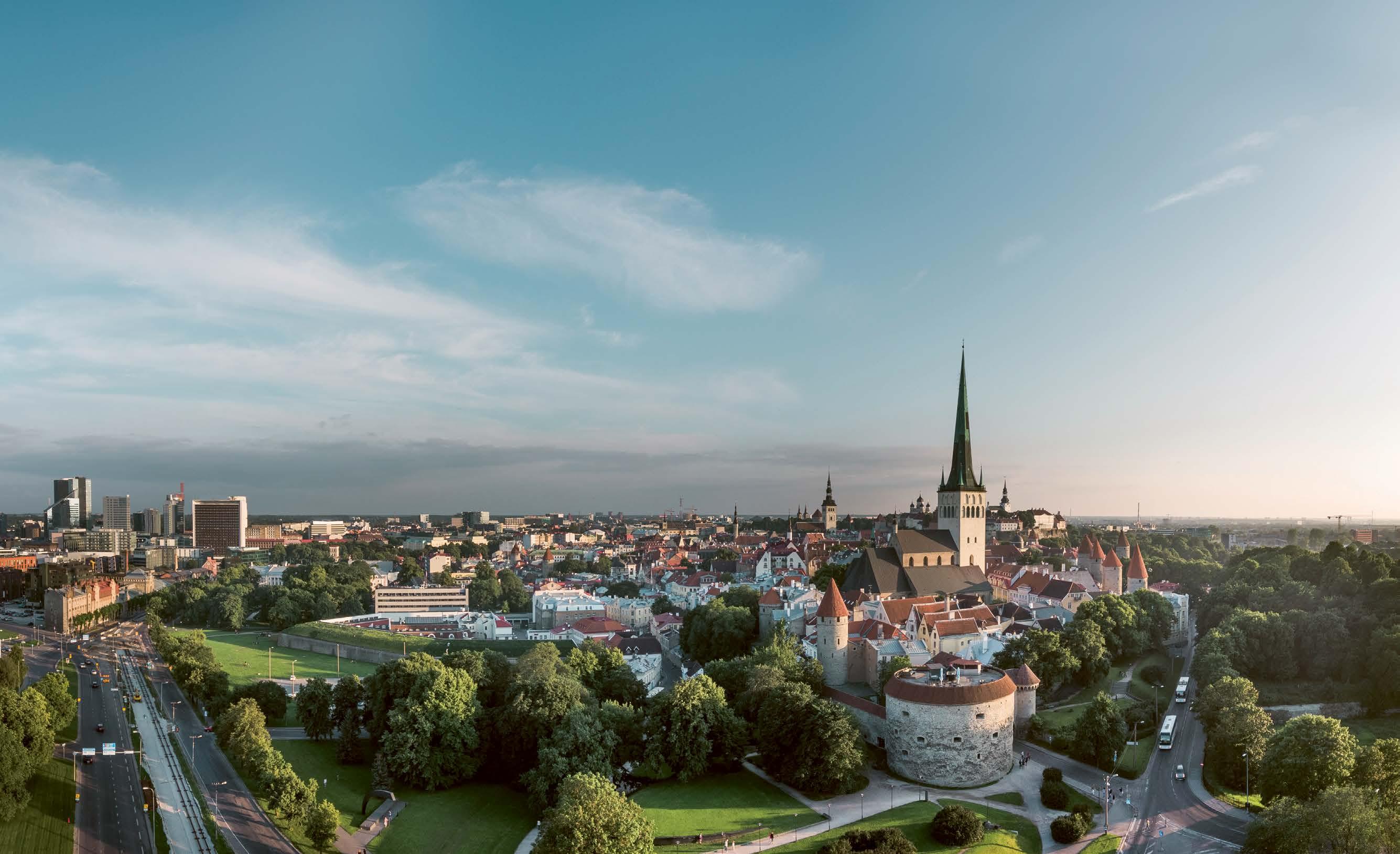

“Sustainability has been at the heart of Monegasque concerns for a long time”
waste management, and find alternative solutions.
Last year, The Monaco Government Tourist Authority signed the Glasgow Declaration, a pledge created by UNWTO to decarbonise tourism. Two carbon calculators were launched: one dedicated to event planners and the other to visitors. The aim is to educate people about their impact on the destination. The carbon calculators give the carbon impact but also present alternative solutions to reduce the carbon footprint of business events.
The Monaco Government Tourist and Convention Authority and the Monaco Convention Bureau have seven representative offices worldwide to build knowledge infrastructure. Christine Barrabino states that this network allows them to contact professionals from the most relevant markets constantly.
“Based on the network, we organise several activities worldwide to educate, explain, and promote our destination as the best choice for organisers. our goal is to ensure that all the assets of the destination are well known and to reach a maximum number of potential clients. The longterm strategy and goals for attracting more business events and congresses
are first to work to gain and keep the loyalty of the organisers who already have chosen Monaco for their meeting. Repeat events are essential to the principality’s yearly events calendar.”
When discussing the future of business events in Monaco over the coming five to ten years, Christine Barrabino wants to share an outlook on the past. She takes us back to April 1914 , when Prince Albert I, the prince of the time, gathered police and lawyers from 24 countries to exchange information on investigation techniques, international cooperation, and extradition. Less than ten years later, this idea became the world-well-known organisation Interpol.
“The example, over a century old, shows the concept of ‘reinventing yourself while keeping your DNA.’ Therefore, I expect that in five or ten years, we will continue to adapt to welcoming events and become more sustainable, especially regarding mobility and energy consumption. Technology will continue transforming our lives in the business events industry, and digital security and artificial intelligence will probably continue to be hot topics.”

TEXT
Anders Sörman-NilssonIn an era where digital transformation converges with sustainability, Twin Transformation emerges as a guiding principle for businesses aiming to thrive. The events industry, at the forefront of adopting these dual imperatives, is evolving into a platform that embraces technology and virtual environments and champions sustainable practices. This approach aligns with the needs of tomorrow’s Conscious Consumers (and the idea of Procurement with Purpose), who demand digital innovation and longrange, sustainable planning. This transformative shift is encapsulated in the concept of digilogue, a fusion of digital skills and analogue sensitivity that is reshaping the future of events.
The Essence of Digilogue in Events Digilogue, a blend of digital and analogue, represents the synergy between cutting-edge technology (like AI) and the human touch. In the context of business events, digilogue implies creating experiences that leverage digital tools to enhance connectivity, cinematic quality, and virtual engagement while preserving
the warmth, soul, and authenticity of personal interactions. This approach is crucial in winning the digital minds and analogue hearts of consumers who value both innovation and genuine human connections.
Leveraging Big Data for Personalised Experiences Big Data is the digilogue approach’s cornerstone, offering deep insights into participant behaviours, preferences, and feedback. By analysing this data, business event organisers can craft personalised experiences that resonate deeply with each attendee. For instance, datadriven insights can inform the design and curation of interactive sessions, speaker selection based on AI predictive analytics, tailored content, and networking opportunities that align closely with the interests and values of the audience, particularly those who prioritise sustainability, innovation and ethical practices.
Twin Transformation in the Business Events Industry Twin Transformation, merging digital transformation with sustainability, demands
reevaluating how events are planned and executed. Events that embody twin transformations are not only technologically advanced but also environmentally conscious. They minimise carbon footprints through virtual platforms and digital twins, reduce waste through sustainable materials and practices, and engage with global audiences without the hefty environmental cost of travel.
Digital Twins and Virtualisation: Expanding Reach and Reducing Impact Digital twins and virtualisation represent key elements in the digilogue strategy, allowing for replicating physical events in a virtual space. These technologies enable a broader global reach and inclusivity while significantly reducing the ecological impact of large-scale gatherings. Digital twins allow organisers to experiment with different layouts and scenarios to optimise the attendee experience and the event’s sustainability. Meanwhile, virtualisation ensures remote participants engage meaningfully, breaking geographical barriers and fostering
a global dialogue on crucial issues like sustainability, cyber threats, and mental health.
A Transformation Economy Approach to Event Curation Adopting a transformation economy perspective, events are seen not just as gatherings but as catalysts for change. This approach involves curating transformative business events in their ability to inspire and facilitate substantial shifts in thought and action
SXSW combines music, film, and interactive media to foster an innovative and culturally rich environment that appeals to a diverse audience.
Tomorrowland leverages advanced technology to create breathtaking aesthetic and auditory experiences, making it a beacon of digital engagement.
Burning Man emphasises community and environmental responsibility, creating a temporary city
among participants. By focusing on transformative experiences, organisers can create digilogue platforms that inform and empower attendees to contribute to sustainability and embrace digital advancements.
Learning from Leading Events Iconic events such as TED, South by Southwest (SXSW), Tomorrowland, and Burning Man offer valuable lessons for future event designs. These events have successfully blended substantial content delivery with immersive experiences, appealing to their audiences’ intellect and emotions. For example:
TED has mastered the art of presenting complex ideas through compelling narratives that resonate on a personal level, often integrating digital tools to enhance viewer engagement.
dedicated to art and self-expression governed by principles of inclusiveness and sustainability.
Designing Future Events with Digilogue at the Core Future events must integrate the dialogue philosophy thoroughly, blending digital innovation with a deep commitment to sustainability. It means deploying technologies such as AI and IoT to streamline operations and enhance user experiences while ensuring that every element of the event, from material use and food to energy consumption, is guided by sustainability principles.
To truly resonate with the conscious consumer, business event organisers must focus on the seamless integration of technology and the authenticity and ethical implications of their practices. The future
of events lies in this dual approach, where technology and sustainability are not seen as separate or opposing paths but as complementary forces that drive the industry forward.
In conclusion, the evolution of business events through the lens of Digilogue, Big Data, Twin Transformation, and a transformation economy approach promises a new era where digital and analogue, innovation and tradition, and technology and sustainability coalesce to create deeply impactful and meaningful experiences. As we move forward, the business events industry is uniquely positioned to lead by example, showing how large-scale gatherings can be both technologically advanced and sustainably responsible, thus winning the digital minds and analogue hearts of tomorrow’s consumers.
Anders Sörman-Nilsson is a futurist and the founder of the Sydney-based think tank and trend analysis firm Thinque, which provides data-based research, foresight and thought leadership assets for global brands across four continents. His vision is to disseminate ‘avantgarde ideas which expand minds and inspire a change of heart’, and clients like ING , Microsoft, Apple, Facebook, McKinsey, Jaguar Land Rover, MINI , Rugby New Zealand, and Lego trust his future guidance. He is an awarded keynote speaker who helps leaders decode trends, decipher what’s next and turn provocative questions into proactive answers. He has published three books, including ‘Aftershock’ (2020), ‘Seamless’ (2017) and ‘Digilogue’ (2013), is a member of TED Global and was nominated to the World Economic Forum’s Young Global Leaders in 2019 . His futurist thinking has been shared by the Wall Street Journal, Financial Review, Monocle, BBC , Esquire and ABC TV
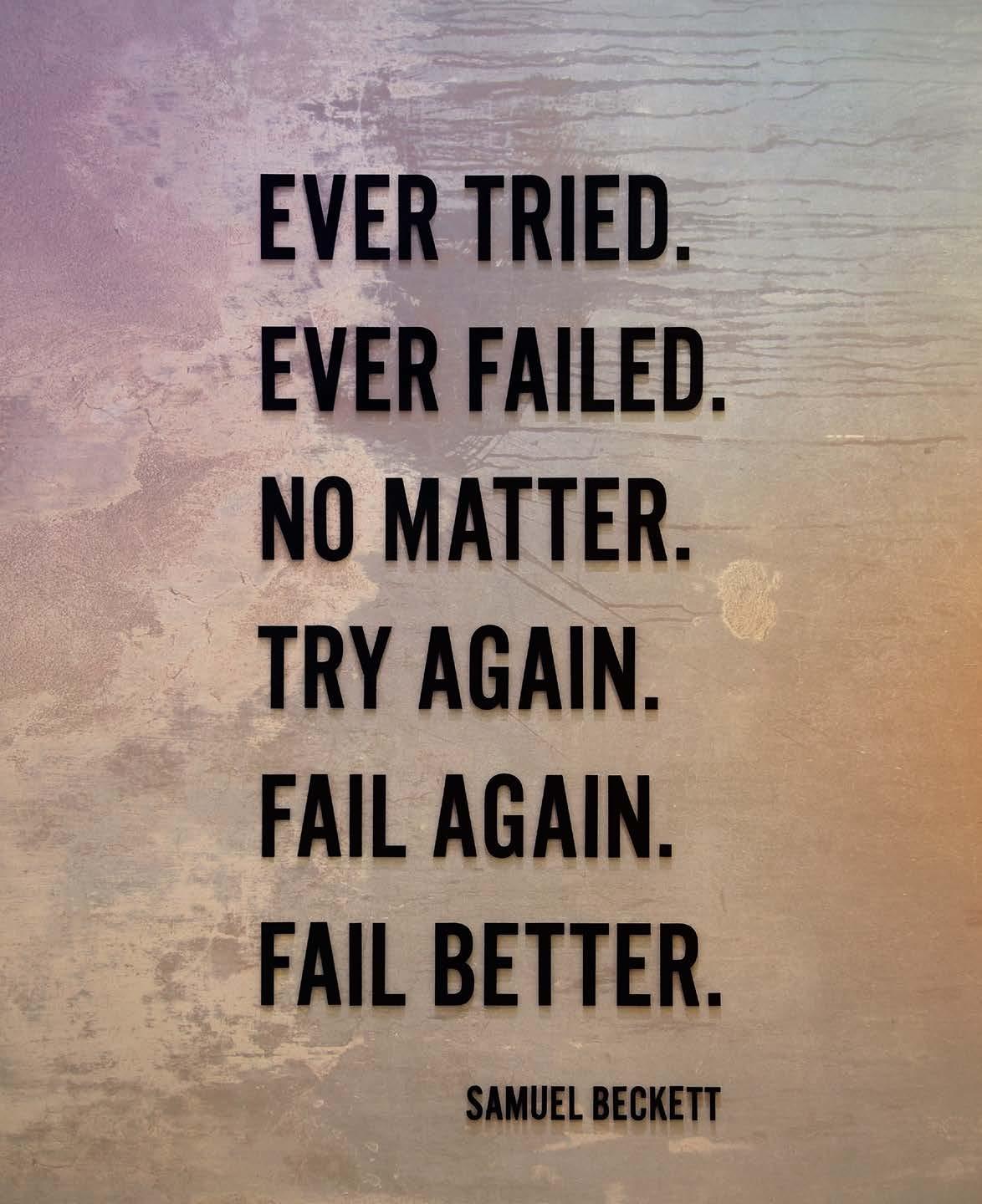

The world is waking up to the possibilities created by AI tools such as generative AI. Let’s explore how these tools could combine to enhance the experience of meeting attendees and speakers at cutting-edge business events two years from now.
The process starts before we arrive at the meeting, with our AI becoming aware that we want to attend an event on a particular topic. The AI scans all the forthcoming events and speakers, creates short video summaries of the best speakers, and compiles background information on the destination and associated total trip costs for each event.
once the event choice is made and the trip is booked, our AI monitors the evolving speaker lineup and delegate list to identify people who might be of interest to us. Those we most want to connect with at the event are then messaged to try to schedule suitable meeting times and locations.
Fast-forward to the event itself and the experience ‘in the room.’ Back in early 2024 , we could already see what the cutting-edge Hollywood
studios could do with these AI tools and what we, as individuals, could do with a few hours’ effort. Jumping forward to January 2026 , mind-blowing developments have taken place. Let’s explore what the cutting-edge possibilities might look like for a global business conference.
Firstly, it is commonplace for each of us to have our own GPT, including all internal and external speakers. These curate every piece of content we’ve ever written and every speech we’ve given, combining it with relevant externally sourced content. It allows speakers to ‘send’ our digital twin to an event to deliver a nearly identical speech virtually or holographically but with a potentially richer delegate Q&A experience.
From the client’s perspective, this has the added benefit of being able to source a simulated version of the very best speakers at a fraction of the cost of having them in person.
When I, as the speaker, am there in person, the audience interaction experience has been transformed. My instant access GPT can whisper in my
ear or display the answers to delegate questions on an autocue. When represented in virtual form, my digital twin will require no whisper support, and all responses will appear natural and seamless.
So, both versions of me can now remember all that I’d written and said over the years but forgotten and provide complete answers to any ques-
interpret their speech patterns, and assess a range of visually observable biometrics like eye movement and breathing patterns. My AI could use all this data and insight to answer questions in a manner that considers the individual’s level of engagement. The technology also now allows me to send personalised video responses to everyone who couldn’t
“ When represented in virtual form, my digital twin will require no whisper support, and all responses will appear natural and seamless”
tion. Going further, I can now draw on my personal GPT to provide case examples relevant to the questioner’s sector and region, whatever the topic. For instance, in five seconds or less, my GPT could find relevant case studies, for example, people tokenising their homes in Africa, organisations implementing effective diversity programmes in the candle-making sector or families 3D printing their own homes in the middle of a major city.
An added benefit of having such comprehensive content is that my AI assistant can provide near-instant written answers to all the questions that people never have the chance to ask in the session in their native language. Whether in person or as my virtual digital twin, my personal AI would be able to access and remember the names of everyone at the event to increase the personalisation of responses.
A combination of cameras and sensors focused on the audience would allow my AI to monitor participants’ microfacial expressions,
ask questions during the session. of course, it wouldn’t matter what language they spoke, as back in 2024 , we already had tools that could translate text into a video of me saying something in 60 different languages simultaneously. Now, addressing a global audience is acceptable, regardless of the nationalities present. Each individual has a personalised version of me on their device screen, instantly translating and delivering the talk in the language they are most comfortable with.
Video storage is now so cheap that every session can be captured and tagged. So, delegates need never fear missing out on a session. our personal AIs will be able to review the video, create edited highlights and summaries of the parts we find of most interest and value, tag them accordingly, and then incorporate all of this into our personal GPT for future use.
As a delegate, when watching any session, we tap our device to indicate a point we want to replay later
because it is of particular interest or when we don’t quite comprehend the point being made. As we go through the session, we can also have our AI create an instant highlights reel based on when our eye movements, brain signals, and other biometric indicators suggest the greatest level of engagement.
The last two years have also seen significant advances in multi-sensory virtual reality/spatial computing headsets and the associated technologies. In 2026 , these now allow us to go into experience zones to interact with virtual content provided by the speakers, participants, and exhibitors. Some of the main programme sessions can also be experienced in these zones so that we can engage with additional content. Imagine walking around a building or destination being discussed on stage or experiencing the new vehicle being launched. We can also now taste an entirely new product range without on-site preparation. Two thousand people can now be given a tasting experience as easily as twenty.
Finally, on the train journey home, we can review the edited highlights reel our AI has created and add appropriate voice notes so the AI can forward relevant segments to colleagues with whom we want to share the material. With the event wrap-up complete, our AI helps soothe us into a much-earned rest after an intense learning and connection experience.
Rohit Talwar is a global futurist, strategic advisor, and CEO of Fast Future. He helps clients in the meetings industry and beyond explore the forces, factors, and developments shaping the future and develop effective response strategies. He focuses on helping clients across various sectors learn and apply cutting-edge generative AI tools to drive creativity, productivity, and effectiveness.








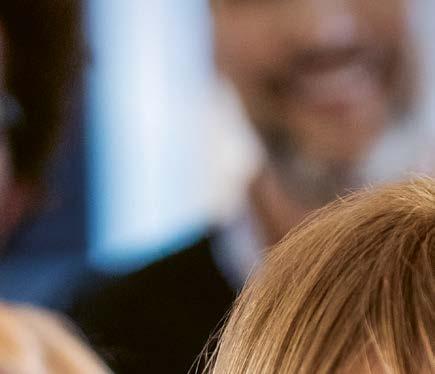




























Shaping the future together. 60 years of Messe München. Perspectives that inspire.




Welcome to the age of Big Data, AI, and analytics, where every interaction and exchange with vendors, suppliers, staff, sponsors, and attendees is a potential source of insight and inspiration. Moreover, with over 2 .5 quintillion bytes of data now being produced every day by human beings (that’s 1 7 MB of information per second for every single person on Earth for those counting), it’s clear that business events organisations will only be looking to analyse thousands of times more data by next year alone to boot.
As a result, as we point out in new technology and training games for events What’s the Future of …? surfacing key insights at a glance (and at scale) will only become increasingly critical to successfully competing
in business going forward. In fact, 50 per cent of corporate decisionmaking is already data-driven, per Capgemini Research Institute. Noting that companies that can harness data’s potential are also 22 per cent more profitable on average than rivals, it’s no surprise that a skyrocketing number of business events firms are also looking to leverage analytics and automation to drive greater agility, adaptability, and returns.
Happily, for business events leaders looking to stay one step ahead of the curve, a growing range of artificially intelligent and drag-and-drop cloud software tools not only makes it possible to ingest more data than ever with less time and effort but also make it much easier for virtually anyone in your business to analyse this
“Customer habits continue to shift rapidly, and entire industries have recently advanced by ten years, technologically, in less than three months alone”
information and retrieve the answers that you need to stay competitive on demand.
Access to such solutions will only become growingly critical in the coming months to boot, as according to McKinsey’s researchers, customer habits continue to shift rapidly, and entire industries have recently advanced by ten years, technologically, in less than three months alone. Bearing this in mind, boosting data literacy rates throughout your organisation and conquering key insights in seconds should now be top imperatives for any firm. In effect, there is a growing divide emerging between companies that enjoy deep access to analytics and those that lack these insights, insights that can mean the difference between surviving and thriving in tomorrow’s business world.
Strikingly, though, given the existential threat that many companies now face, analysts at market research firm Forrester report that 60 –73 per cent of all corporate data still goes unused. Moreover, many firms have still been slow to democratise access to data throughout their workforce and to teach employees to think more like data scientists. This presents a
clear and pressing danger in a world where virtually any event, supply chain or workplace variables can suddenly change on a dime, for example, in the wake of a global pandemic, and even more so with worldwide data literacy rates continuing to lag far behind the pace of industry change. In a telling wake-up call to businesses, global advisory firm Gartner remind us that an online- and digital-focused company’s success no longer primarily hinges on access to cutting-edge technologies or financial resources alone.
Instead, it now depends on all employees being tech-savvy workers who can “speak data,” as it were. Thus, your workforce’s capacity to spot and surface actionable information and key insights within your company is crucial.
Thankfully, a host of easily configured and utilised online tools and solutions that allow analytics and automation capabilities to be quickly deployed across your organisation can help you access the information you need to succeed. Available from myriad providers, these solutions give workers the tools and data to spark organisational growth and transformation at scale.
They also give firms of all sizes unprecedented visibility into events, workflows and operations that can be leveraged to help an organisation become more agile and adaptable while simultaneously automating and optimising business outcomes. Put simply: By designing your digital transformation strategy to serve multiple purposes, for example, helping you more effectively gather, analyse, and digest information while streamlining processes and slashing costs; you can accomplish various goals in one fell swoop.
Ultimately, in coming years, success will be found by skillfully managing workflows and expenses and by giving every employee in your company the power to innovate and drive huge breakthroughs (for example, democratising the business of data science) at scale.
For instance, just a few sources of insight and information that you can now be tapping into (or feeding into predictive analytics and AI programs for actionable strategies and suggestions) would be:
Survey, Questionnaire and Poll Data
Ticket Sales, Registrations and Signups
We’ll do the same
Bringing together a world of possibilities
Growing up, Pamela knew all about events taking place in the RAI. “It was always a dream of mine to work in events and I like to travel, so I was excited when I got a job at the RAI.” In her role as International Business Development Manager at RAI Amsterdam, Pamela attracts B2B events to Amsterdam. “I work with our partners to connect and help clients implement events at the RAI. The RAI is not just a conference centre, we bring together a world of partners and knowledge.” Pamela works with many organizations, companies, universities, and the City of Amsterdam. “That’s what I like: bringing people together and connecting with them.”
“Together with the City of Amsterdam, we are trying to attract companies and events within the Life Science Industry to the Netherlands, such as HTLH Europe. It is a dynamic community with leaders, pharmaceuticals, and scientist who are coming together, share knowledge
and bring up new innovations. This is a perfect example of how we bring all stakeholders to the table to create an outstanding event.” HLTH Europe believes in the power of the community to solve health’s most pressing issues. The event is taking place from 17-20 June 2024 in RAI Amsterdam, where leaders from over 50 countries from every part of the European health ecosystem will connect, alongside world-class speakers, immersive attendee experiences, incredible networking events and parties, and impactful networking programmes.
The future is bright
For the 2030 plan, the RAI is looking to add more public functions for the neighbourhood and to make more space available to everyone. “It’s so inspiring when we can bring our event visitors and local residents together where everyone can feel welcome and at home. I can’t wait!”
Find out more about meeting in NL on holland.com/meetings
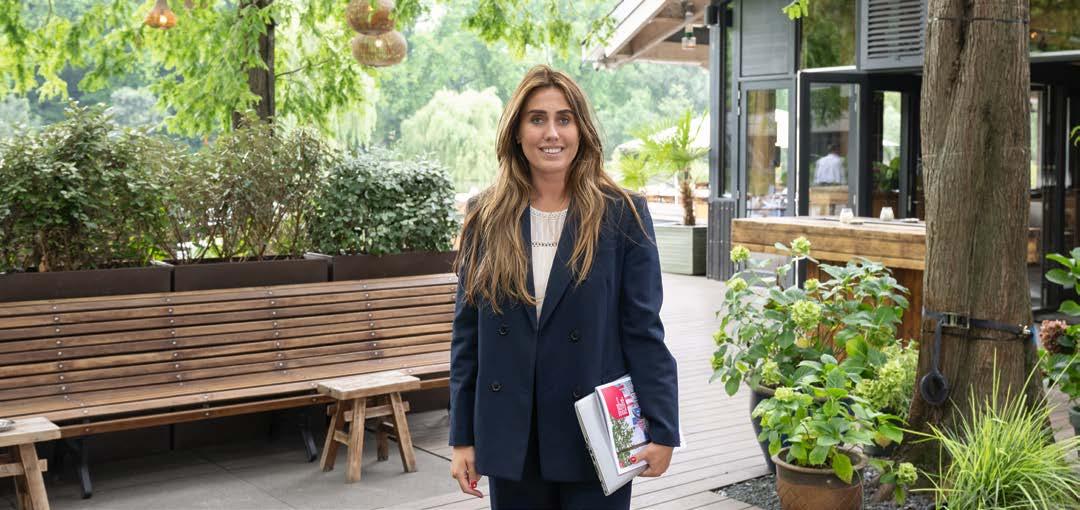 Pamela Peetoom International Business Development Manager RAI Amsterdam
Pamela Peetoom International Business Development Manager RAI Amsterdam
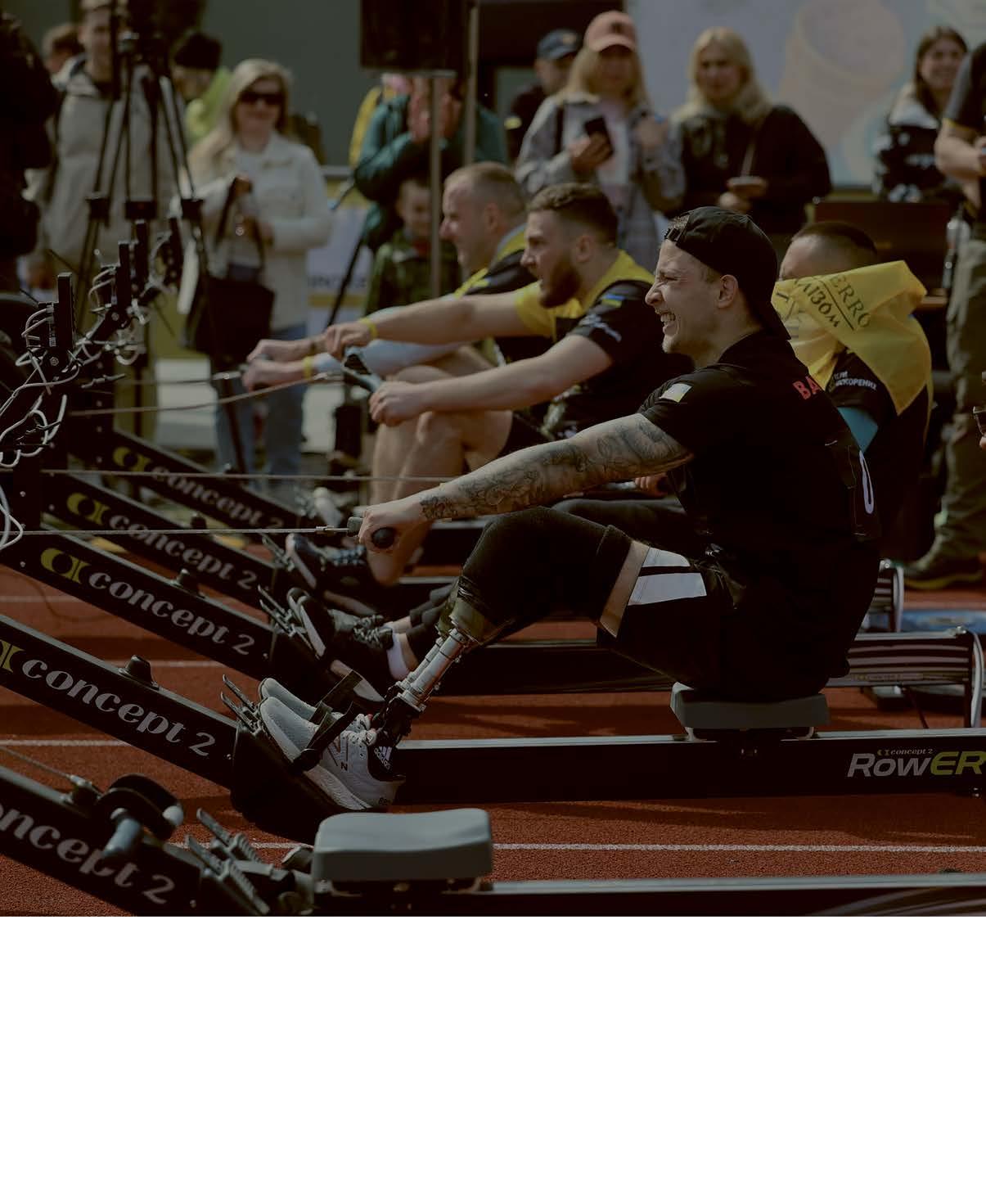
“There is a growing divide emerging between companies that enjoy deep access to analytics and those that lack these insights”
Advertising, Marketing, and Newsletter Performance
Website, Email, and Video Uptake
Social Media Exchanges and Interactions
Submissions, Suggestions and Audience Feedback
Customer Support Inquiries and outreach
online Behaviors and Interactions
Sales, Clickthroughs, and open Rates
Search Queries and Requests
From a business events leader’s standpoint, these insights can mean the difference between playing guessing games and knowing precisely how to craft event programming, style marketing and outreach efforts, and adapt meeting formats to address fast-changing market conditions. For suppliers and vendors, it can mean adding the capability as a business to know exactly how to best engineer processes and deliveries, maintain optimal workforce and inventory levels, and determine which products and solutions tomorrow’s meeting planners will most find in demand. In other words, data is now the lifeblood of a modern organisation, and knowledge is power in the digital economy. Bearing this in mind, in coming years,
your company’s fortunes will only become more dependent upon access to information and the ability to draw upon key findings in the future.
In effect, like cultivating the ability to leverage artificial intelligence and machine learning to gain deeper insights and understandings into business activity, enjoying growing access to analytics and automation capabilities across your organisation is a must. However, suppose you want to get ahead in tomorrow’s working world. In that case, it also bears reminding that, as a business, you must give your people all the tools and training they need to surface vital market clues and make smarter decisions with less time and effort.
To wit, finding ongoing success in the future won’t just be about improving your ability as a company to enjoy unfettered access to information. As we conclude in the critically acclaimed book Think Like a Futurist: The Next Normal, it’ll also be about training your people to get smarter about how they work with data and the business questions they use this information to ask.
At the same time, in an age where trust also reigns supreme, remember that data privacy remains a pressing concern for meeting and event
leaders today, with the total number of corporate data breach incidents up by 20 per cent in the past year alone. It’s also quickly becoming pricey, with the average cost of data breaches reaching a record-breaking $4 45 million per incident, the highest in nearly two decades. Moreover, it is notable that roughly nine in ten customers will take their business to a competitor if they don’t believe that their data is being well-handled. Privacy hasn’t just become a business watchword in 2024
With 79 per cent of customers now considering data privacy a factor in purchase decisions and actively willing to spend added time and money to protect their information, it’s also become imperative for business events pros in the future. Adopting a privacy by design philosophy around your events and audience outreach programs can help you create a competitive advantage here and better safeguard your company and its clients by learning to weave.
Privacy by design is a strategic concept that encourages companies to incorporate privacy measures across all IT networks, systems, signups, apps, customer touchpoints, end-user interactions and organisational procedures. Likewise, from an
“Your workforce’s capacity to spot and surface actionable information and key insights within your company is crucial”
engineering standpoint, it champions integrating privacy-focused solutions into the earliest drafts of design concepts and interweaving comprehensive security and privacy measures across new innovations. They are prompting organisations to prioritise core principles of privacy and data protection by default, which, in effect, challenges companies to proactively anticipate possible points of data breach or failure and plan against future threats. Noting this, it shouldn’t be a shock that half of all global executives now say cybersecurity- and privacy-focused strategies are being integrated across every business decision and plan. That said, in an age of rising digital dangers, for example, ransomware, open-source software vulnerabilities, and growing cooperation amongst cybercrime organisations, it’s no surprise that meeting and events pros are also evolving their approach to addressing tomorrow’s privacy-related concerns. For example, they no longer think solely about safeguarding shared information and online interactions but institute better data collection practices. Instead, they’re also growingly working to create ways to inform better and empower their customers and emphasise delivering
digital solutions that offer clients a greater sense of choice, agency, and control. As these forward-thinking organisations realise, successfully meeting the needs of tomorrow’s audiences won’t just be about delivering secure interactions. Instead, it’ll also be about ensuring that your event sponsors and attendees enjoy more excellent command over what information they share, with whom, where, and to what extent.
Bearing this in mind, business event industry pros of every kind are making it a point to increasingly integrate extensive and nuanced privacy controls throughout every customer interaction (for example, event registrations, signups, and submissions). Likewise, more and more companies are working to surface the previously invisible spiderweb of digital touchpoints at which information is exchanged with third parties and offering users opportunities to decide how and to what extent they’re willing to be tracked. The benefits of adopting these privacy-first policies go far beyond reputational and public relations wins to boot: After all, a winning privacy strategy can “fuel user adoption and revenue growth, and help companies increase or retain market share”, as eMarketer notes.
Conversely, breaches of trust can create opportunities for rivals to gain at your expense.
Bearing in mind the importance of establishing and maintaining this trust to drive audience growth and customer loyalty, as well as the role it will play in driving the adoption of future innovations, be advised. Core strategic concepts to stay attuned to and embrace as you look to incorporate privacy into your event design process more actively in the coming months include as follows:
Give customers and event attendees a greater sense of authority and control Be transparent with your client about the types of information you’re collecting and the methods and mediums through which you’re gathering it. Provide privacy dashboards, menus, and command centres that allow them to control how, when, and to what extent their data is being collected and shared.
As a rule of thumb, default to privacy-first settings Unless a user actively gives permission, they automatically default to settings that do not monitor their activity, gather their data, or share information with third parties.
“Privacy by design is a strategic concept … Breaches of trust can create opportunities for rivals to gain at your expense”
Be candid with audiences about how your business model works Give your clients a deeper understanding of any exchange of value (for example, if you’re providing content or services free of charge because they’re trading for access to it by sharing their data) and what’s being swapped in any given transaction.
Prioritise client and attendee satisfaction Default to internal policies that deter the active gathering, use, or exchange of customer data. Dedicate teams to developing privacy-focused innovations. Always ask for users’ consent (for example, via online opt-ins) before onboarding their information into your apps, websites, or event management systems.
Offer options to wipe information clean Provide customers with access to solutions that allow them to permanently wipe data, contacts, browsing histories, searches, locations, and personal identifiers from your offerings and solutions and, if so desired, permanently wipe them from your databases.
Given rising stakeholder activism and audience awareness, business
event firms will increasingly leverage privacy as a source of business differentiation and competitive advantage in the coming months. on the bright side, while this shift in thinking may cause more data science-driven and market research-minded firms to sweat, it bears reminding: What you lose in analytics here, you stand to gain in customer experience instead. After all, 90 per cent of privacyminded users now believe that how their data is treated reflects how they are treated as customers. In the coming decade, learning to put clients’ privacy first will be increasingly viewed as a basic form of digital courtesy and respect. It will also be seen as a vital business principle.
Long story short Data is now your business’s beating heart. Learning to listen to and interpret that heartbeat and keep it pumping steadily will only become increasingly critical to building and maintaining a competitive advantage.
Award-winning strategic consultant and professional speaker Scott Steinberg is among today’s best-known trends experts and futurists , and the bestselling author of “ Think Like a Futurist : The Next Normal; Make Change Work for You” and “ Fast >> Forward: How to Turbo-Charge Business, Sales, and Career Growth .” The creator of “ What’s the Future of …?”, a new series of training games for play at meetings and events, and the President and CEO of BIZDEV: The International Association for Business Development and Strategic Partnerships. www.FuturistsSpeakers.com

Roger Kellerman Publisher, business intelligence analyst, trend creator, educator and networker. Has over 40 years’ experience of the global meeting industry. Founder of Mötesindustriveckan. twitter.com/thekellerman
How many international “competitions” are there to select the world’s, the continent’s, or a certain region’s or country’s, best hotel? How many owners and managers happily send their best-looking employees, in their fanciest outfits, to these so-called award ceremonies around the world to promote their “wins?”
If we take a closer look at the, perhaps, most significant of these competitions, an incredible array of awards is revealed. For Europe alone, there are 147 awards listed in various categories, divided by 56 European countries, most with several categories each. And within each category, there are five to eight nominated hotels, resorts, conference hotels, or car rental companies, and so on. Many times we find owners who have put up several nominees from their group, since you are free to submit as many nominees as you like, as long as you’re willing to pay the entrance fee for each of them.
Someone has called this the hotel industry’s equivalent of the film industry’s Academy Awards. Nothing could be further from the truth. obviously, a lot of marketing and politics do go into winning many an oscar, but you can’t just buy yourself a nomination, and at the end of the day, you really do need to win the vote of the members of the Academy. But here, you can simply pay your way into the competition and then secure enough extra votes to win your category.
In this competition, the entry fee is either €466 or €582 , but the organisers claim that the fee also buys you digital exposure worth €349 (presumably consisting mainly of people being exposed to your logo and info while voting). And obviously, they don’t reveal who, or even how many, are actually voting, except to clarify that votes are weighted differently, depending on who’s doing the voting.
Clearly, something like this won’t change just because it’s questioned in a column in Meetings International, but it would be interesting to learn just how much money they earn from registration fees for this competition. Even the most cursory math suggests that it’s certainly not small potatoes. And it’s worth noting that these types of competitions appear to grow each year. But are you really the best of the best when you win? Highly doubtful. How good is your hotel or resort really? It’s a fairly simple equation. Just check the last line of your annual report. If you’re making a profit, you’re a good company. If you’re making a big profit, you’re probably an even better one. And if you have 30 per cent or more left on the bottom line, then winning a pay-to-enter competition simply shouldn’t be of any consequence to you.
Everyone simply can’t be the best, that’s just unreasonable. And when just about anyone could just buy and orchestrate a win for themselves, then the “win” simply loses its
meaning. Even if your winning smile should be lined with golden teeth at the awards ceremony, purchased success never tastes as sweet. Even if you really are the very best in your field, surely a win in a mock competition like this still leaves a bit of a bad taste in your mouth?
Your actual customers have highly relevant opinions and feelings about your company and your staff’s work. Faraway voters, who may have never even set foot in your establishment, don’t. But unfortunately, it’s possible to influence people to believe in your excellence without them actually knowing anything about it.
There’s a lot of so-called washing going on throughout the business event industry: greenwashing, sportswashing, social corporate washing, and legacy washing. Non-specifically, there is also bluewashing, brownwashing, whitewashing, rainbowwashing, and security washing. Now, we can add award washing to the list.
You are never better than your actual customers say you are. And as long as they keep returning, you have every reason to feel like a winner. Seeing customers become regulars, that’s your reward. As an extra boon, it’s also the foundation of a profitable business. Achieving that, is what should be your goal, rather than basking in the make-believe glory of an award you’ve more or less picked off an award store shelf. Instead of award washing, just clean up your act.
This is The CCD, an iconic building in the centre of Dublin, the home of one hundred thousand welcomes. When you choose The CCD for your event, you’re not just getting a venue. You will be warmly welcomed to a stunning and light-filled building in the heart of Dublin, a city steeped in history, culture and beauty. You will experience the best of Irish hospitality, with sustainable and locally sourced produce. When you bring your event to The CCD, your event is our event. Our team of experts will partner with you to deliver your event seamlessly and beyond your expectations.

Meet us at stand F460
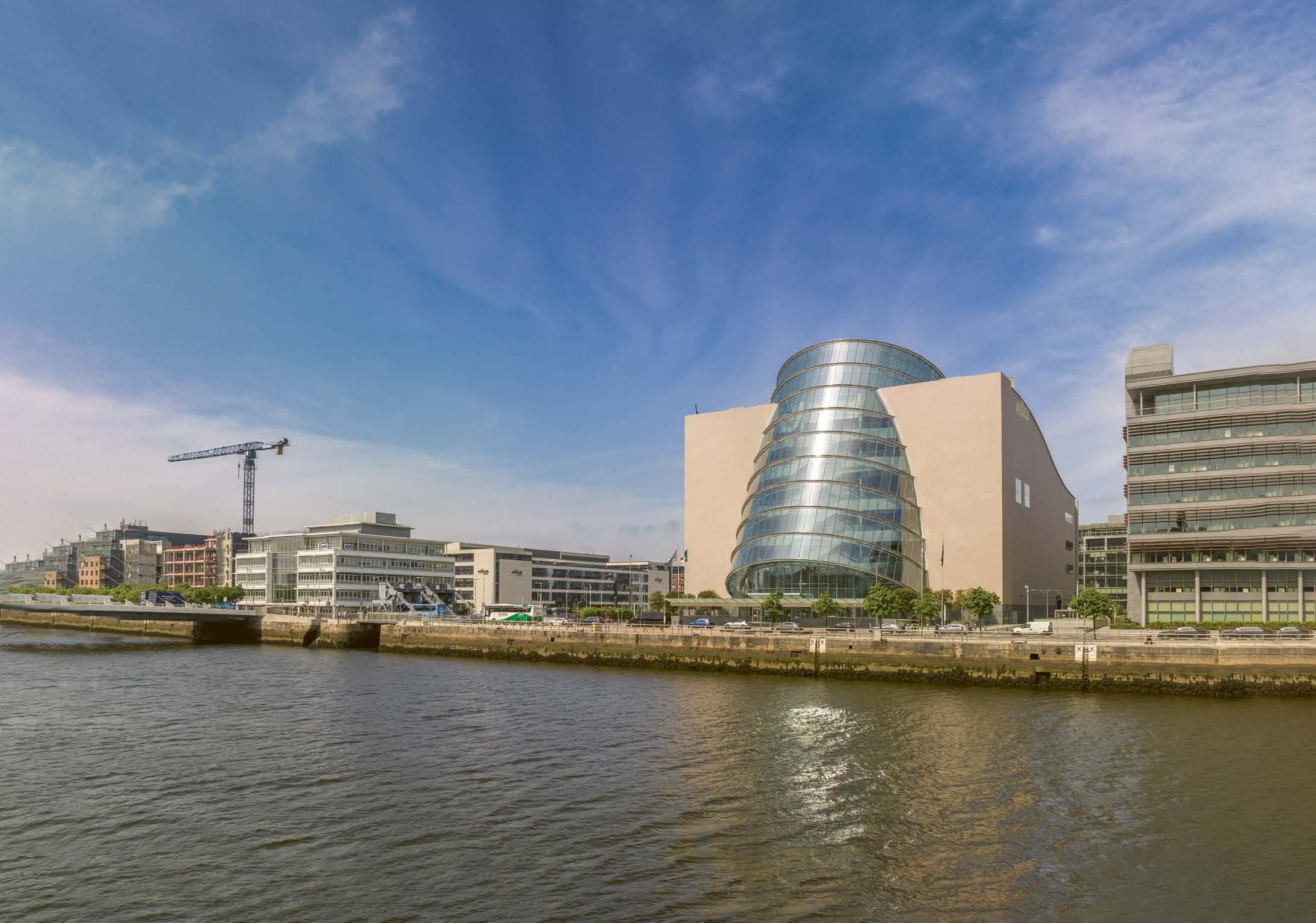
w: theccd.ie
e: info@theccd.ie
t: +353 1 8560000
